
This story originally appeared on CoPilot and was produced and distributed in partnership with Stacker Studio.
States with the highest gas tax
The coronavirus pandemic has curbed Americans' love for the road, keeping many people at home in the past year and cutting into sales at the fuel pump.
That has meant a backlog in work funded by gasoline taxes. More than $8.5 billion worth of highway work and other infrastructure projects across the United States have been canceled or halted temporarily, the American Road and Transportation Builders Association told the Washington Post. Even before the pandemic, many states’ highway funds were becoming depleted, failing to keep up with construction and repair demands. A study completed in 2020 by accounting firm KPMG predicts that miles traveled will remain at about 90% of pre-2020 levels.
The pandemic has focused new attention on a problem that states are grappling with throughout the country. With increased sales of electric vehicles and fuel-efficient vehicles, how should states fund transportation projects? Some are considering levying a tax based on miles driven. Others are promoting green initiatives that could see increases at the pump.
The current 2021 U.S. average tax rate stands at 36.83 per gallon for gasoline and 37.85 for diesel fuel. CoPilot used 2021 data from the American Petroleum Institute to rank states with the highest gasoline and diesel taxes. The states are ranked by the 2021 gasoline tax, ties are broken by the 2021 diesel tax, and further ties are left. Both the state excise tax and other state taxes and fees are included in the tax data points. While this data is current as of Jan. 1, 2021, other federal, state, and local fees could be applied depending on an individual’s vehicle and fuel type, and tax rates are always subject to change based on state legislation. CoPilot also included a data point from the U.S. Federal Highway Administration showing total gasoline use in every state during 2019, the most recent year available.
Think you might be overpaying at the pump? See how your state's gas taxes compare to other states across the country.

#50. Alaska
- 2021 gasoline tax: 13.79 cents per gallon (-62.6% less than national average)
- 2021 diesel tax: 13.82 cents per gallon (-63.5% less than national average)
- Total gasoline use: 285,286 gallons (242,562 highway, 42,724 nonhighway)
Alaska’s gasoline tax is the lowest in the country. In March 2020, the state’s Senate voted to raise the tax from 8 cents per gallon to 16 cents per gallon, with some lawmakers saying the money was needed for poorly maintained roads. The tax last rose in 1970, according to Republican Sen. Click Bishop, who proposed the change. Approval would also be needed from the House and the governor.
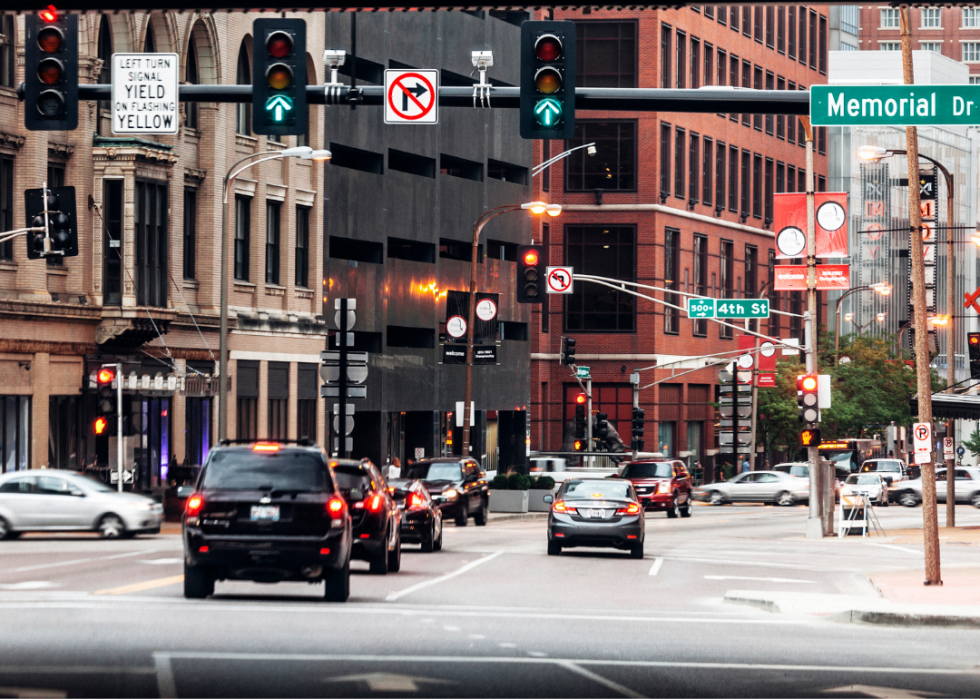
#49. Missouri
- 2021 gasoline tax: 17.42 cents per gallon (-52.7% less than national average)
- 2021 diesel tax: 17.42 cents per gallon (-54.0% less than national average)
- Total gasoline use: 3,210,871 gallons (2,993,792 highway, 217,079 nonhighway)
The president pro tem of the Missouri Senate, Dave Schatz, wants to phase in a 10-cent increase in the motor fuel tax. Two years ago, voters rejected a raise in the gasoline tax. Schatz filed two proposals in December, about when a new report from TRIP, a private nonprofit research group, found that Missouri’s roads cost drivers $8 billion a year.
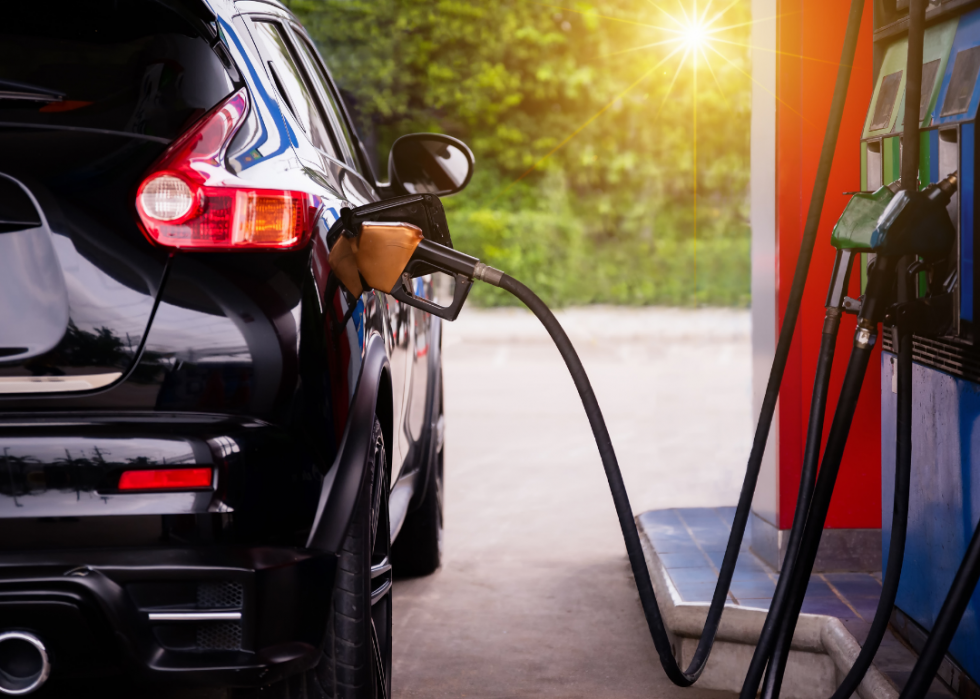
#48. Mississippi
- 2021 gasoline tax: 18.79 cents per gallon (-49.0% less than national average)
- 2021 diesel tax: 18.40 cents per gallon (-51.4% less than national average)
- Total gasoline use: 1,754,685 gallons (1,668,608 highway, 86,077 nonhighway)
In 2019, the Mississippi legislature decided against raising the gasoline tax. At the time, the chairman of United Parcel Service, a Mississippi Delta native, supported the increase to fund highway repairs and construction, the Clarion Ledger reported. The tax has not risen since 1987.
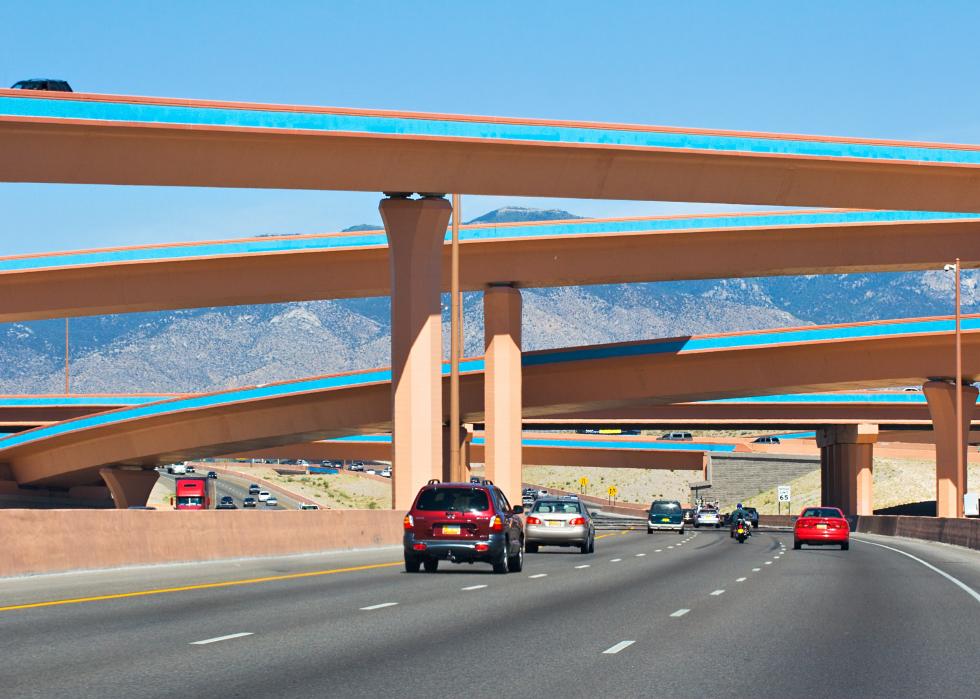
#47. New Mexico
- 2021 gasoline tax: 18.88 cents per gallon (-48.7% less than national average)
- 2021 diesel tax: 22.88 cents per gallon (-39.6% less than national average)
- Total gasoline use: 1,029,934 gallons (959,431 highway, 70,503 nonhighway)
A proposed gasoline tax increase of 10 cents a gallon died in a House committee in February 2020. The sponsor noted that the state has the third worst roads in the country. TRIP found the state’s poor roads had cost motorists $900 million.
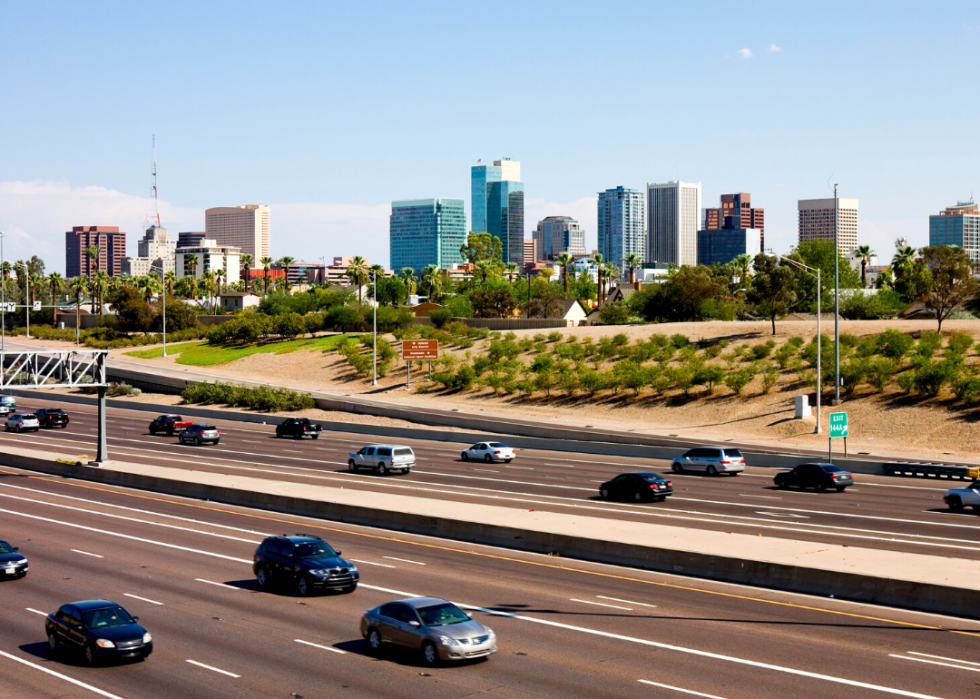
#46. Arizona
- 2021 gasoline tax: 19.00 cents per gallon (-48.4% less than national average)
- 2021 diesel tax: 27.00 cents per gallon (-28.7% less than national average)
- Total gasoline use: 3,066,272 gallons (2,831,627 highway, 234,645 nonhighway)
Lawmakers in 2020 proposed doubling the gasoline tax over three years with incremental increases of 6 cents per year. The tax had not been increased since 1991. But the Phoenix Business Journal reported that the bill did not appear to be winning the two-thirds majority it would need to pass.
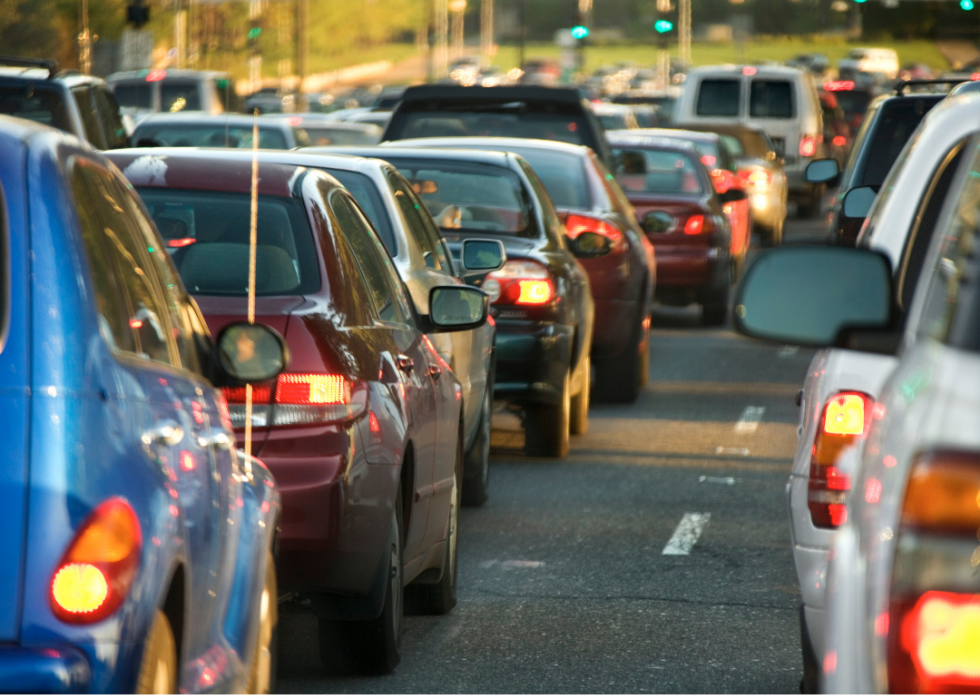
#44. Oklahoma (tie)
- 2021 gasoline tax: 20.00 cents per gallon (-45.7% less than national average)
- 2021 diesel tax: 20.00 cents per gallon (-47.2% less than national average)
- Total gasoline use: 1,979,555 gallons (1,815,899 highway, 163,656 nonhighway)
Oklahoma raised its gasoline tax in 2018, marking the first increase since 1987. The revenue was set aside for transportation, replacing general fund money that had previously been used to bankroll such projects. The general fund money was then diverted toward raises for the state’s teachers, who had led a wave of protests that spring calling for better wages.
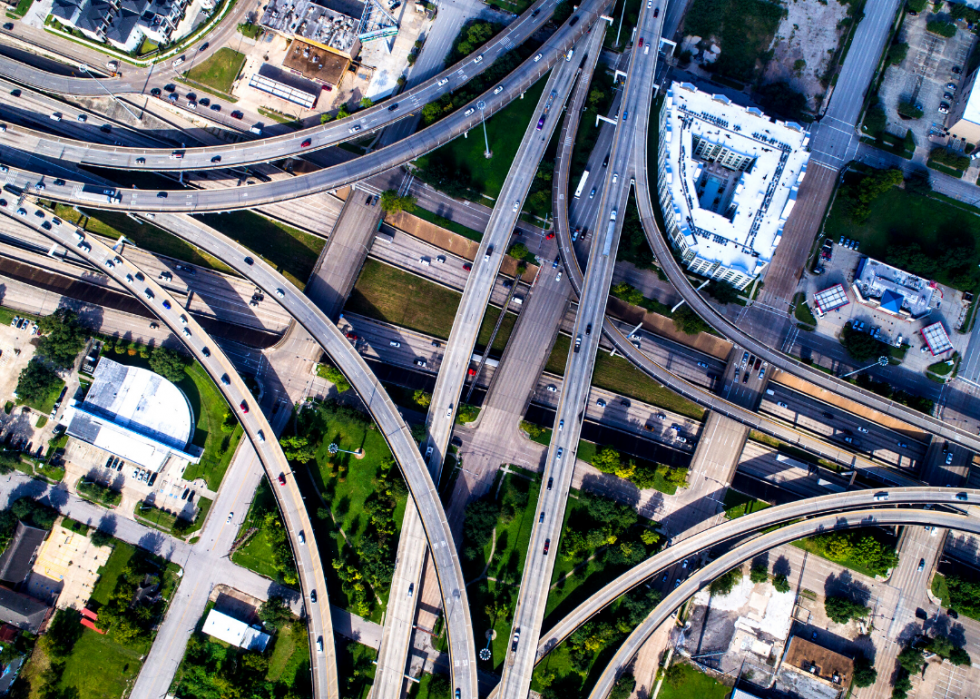
#44. Texas (tie)
- 2021 gasoline tax: 20.00 cents per gallon (-45.7% less than national average)
- 2021 diesel tax: 20.00 cents per gallon (-47.2% less than national average)
- Total gasoline use: 14,940,212 gallons (14,271,917 highway, 668,295 nonhighway)
State Rep. Ray Lopez of San Antonio proposed raising the Texas gasoline tax by 2 cents last year, noting that the current rate was set in 1991. The increase is projected to generate more than $2.5 billion in the first five years, revenue which would go toward transportation improvements and schools statewide.
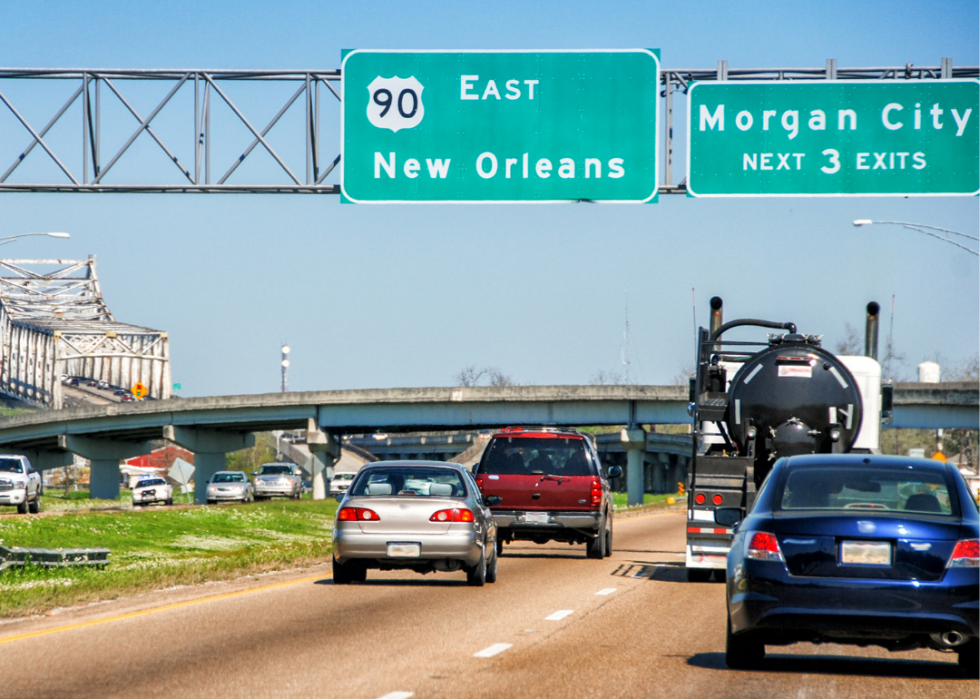
#43. Louisiana
- 2021 gasoline tax: 20.01 cents per gallon (-45.7% less than national average)
- 2021 diesel tax: 20.01 cents per gallon (-47.1% less than national average)
- Total gasoline use: 2,253,184 gallons (2,089,133 highway, 164,051 nonhighway)
A group called the Louisiana Coalition to Fix Our Roads wants to increase the state gasoline tax by 10 cents a gallon to raise $300 million a year, and then by another 2 cents every other year until 2033. The increase of 22 cents over a decade would be used to tackle $14 billion in necessary road work, the group says. The last attempt to raise the tax failed in 2017 without a full vote in the House or Senate. The next legislative session begins in April 2021.
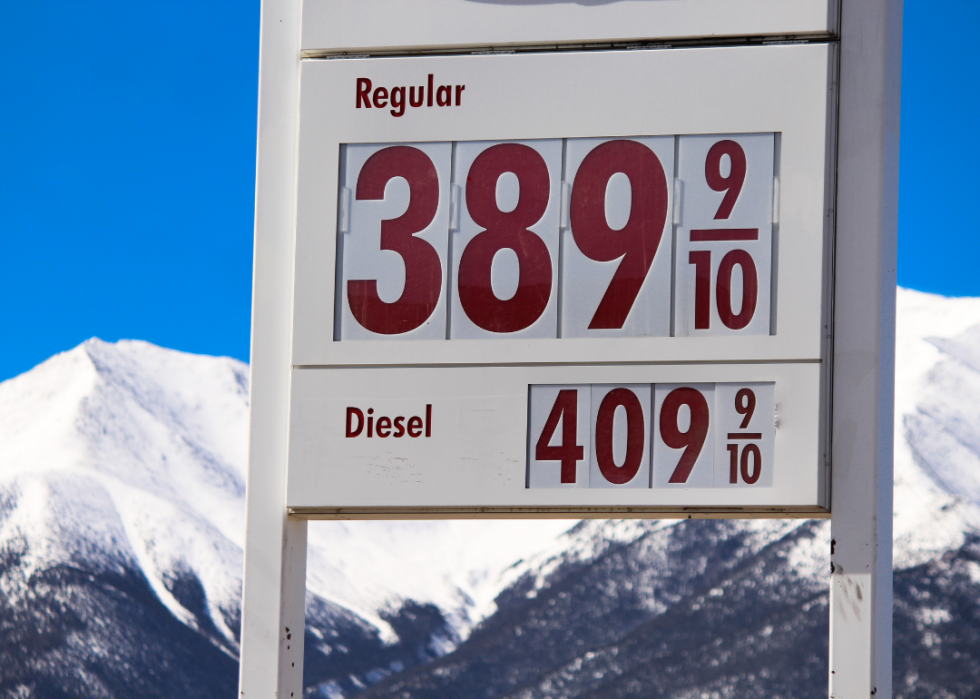
#42. Colorado
- 2021 gasoline tax: 22.00 cents per gallon (-40.3% less than national average)
- 2021 diesel tax: 20.50 cents per gallon (-45.8% less than national average)
- Total gasoline use: 2,455,221 gallons (2,270,649 highway, 184,572 nonhighway)
Colorado lawmakers are considering a surcharge in addition to the current 22 cents per gallon gasoline tax, as well as a road-usage charge, under which drivers would pay a fee based on the number of miles driven. Neither amounts have been decided. Democratic Gov. Jared Polis wants more electric vehicles and higher fuel-mileage vehicles on the state’s roads, which The Colorado Sun notes would decrease the gas tax revenue and require a new source of funds for road improvements.
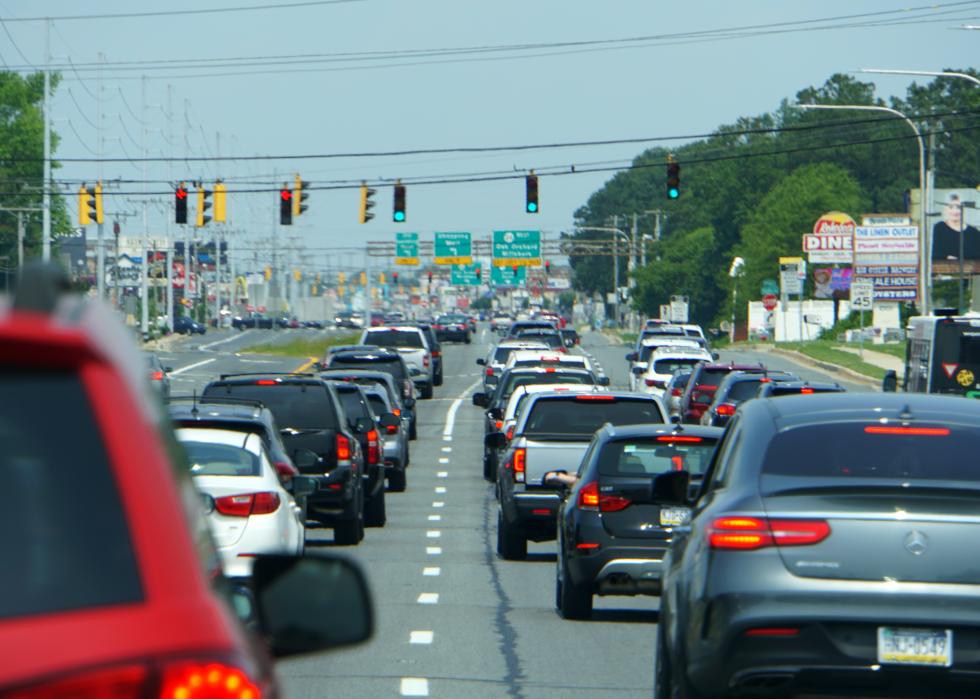
#41. Delaware
- 2021 gasoline tax: 23.00 cents per gallon (-37.6% less than national average)
- 2021 diesel tax: 22.00 cents per gallon (-41.9% less than national average)
- Total gasoline use: 557,631 gallons (522,552 highway, 35,079 nonhighway)
Delaware is another state looking closely at whether to change how it raises money for transportation. One alternative would be to bill car owners monthly based on mileage. Road construction and maintenance costs are projected to almost double over the coming decade.

#40. North Dakota
- 2021 gasoline tax: 23.00 cents per gallon (-37.6% less than national average)
- 2021 diesel tax: 23.00 cents per gallon (-39.2% less than national average)
- Total gasoline use: 452,221 gallons (411,541 highway, 40,680 nonhighway)
State lawmakers are considering increasing the gasoline tax by 6 cents and more than doubling the road-use fee paid by drivers of electric and hybrid vehicles. The road-use fees, enacted in 2019, would rise to $250 for electric vehicles and to $150 for hybrids. The proposal won the endorsement of a House committee on Feb. 1, 2021, to help pay for road and bridge improvements. The last increase was 16 years ago.
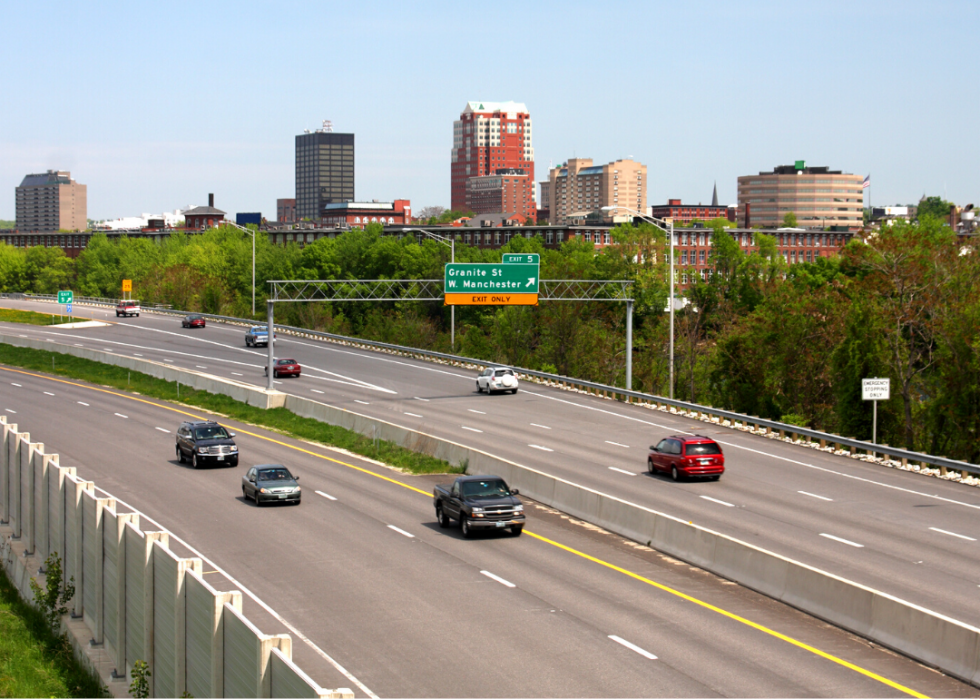
#39. New Hampshire
- 2021 gasoline tax: 23.83 cents per gallon (-35.3% less than national average)
- 2021 diesel tax: 23.83 cents per gallon (-37.0% less than national average)
- Total gasoline use: 740,925 gallons (677,217 highway, 63,708 nonhighway)
New Hampshire's first increase in its gasoline tax since 1991 came in 2014, when lawmakers added 4.2 cents to the rate. The change was intended to bring in an additional $32 million a year for the state’s department of transportation: 42% of the money was set aside to widen Interstate 93.
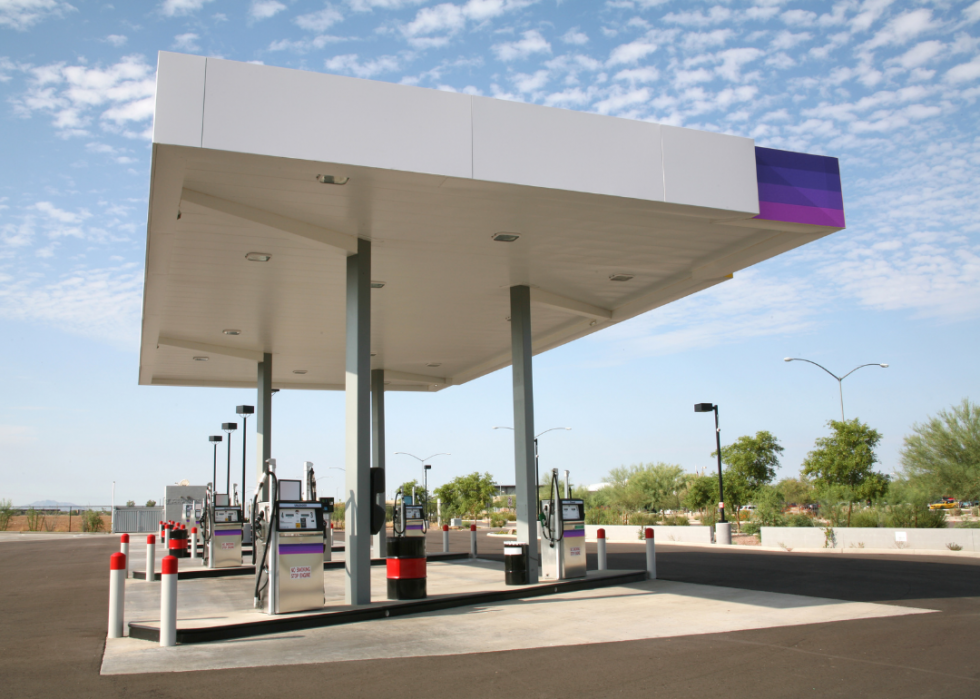
#38. Wyoming
- 2021 gasoline tax: 24.00 cents per gallon (-34.8% less than national average)
- 2021 diesel tax: 24.00 cents per gallon (-36.6% less than national average)
- Total gasoline use: 367,969 gallons (293,603 highway, 74,366 nonhighway)
Wyoming lawmakers are considering raising the state’s gasoline tax to 33 cents per gallon. The proposal is sponsored by the state legislature’s Joint Revenue Interim Committee. The measure is expected to raise $60.3 million, with the bulk of it—$40.24 million a year—to be allocated to the state highway fund.

#37. Kansas
- 2021 gasoline tax: 24.03 cents per gallon (-34.8% less than national average)
- 2021 diesel tax: 26.03 cents per gallon (-31.2% less than national average)
- Total gasoline use: 1,385,878 gallons (1,284,250 highway, 101,628 nonhighway)
The Kansas gasoline tax has not changed since 2003. In 2017, lawmakers considered raising the tax 5 cents for projected revenues of approximately $92 million or 11 cents for revenues of approximately $203 million for the 2019 fiscal year. The debate has continued in the ensuing years.
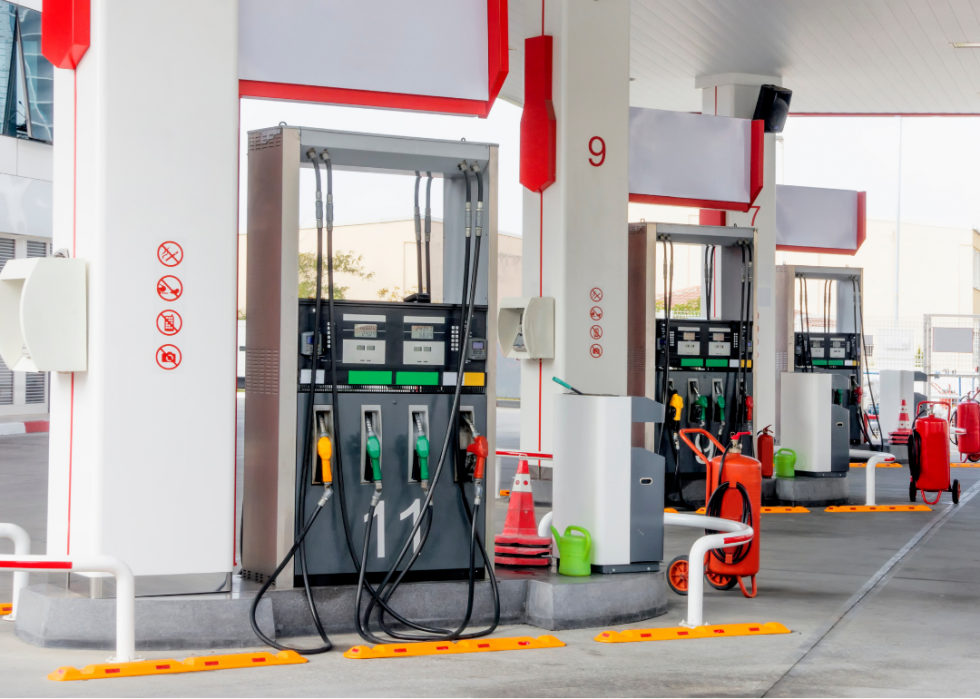
#36. South Carolina
- 2021 gasoline tax: 24.75 cents per gallon (-32.8% less than national average)
- 2021 diesel tax: 24.75 cents per gallon (-34.6% less than national average)
- Total gasoline use: 2,889,637 gallons (2,669,735 highway, 219,902 nonhighway)
A tax increase of 2 cents per gallon of gasoline took effect in South Carolina in July 2020, the fourth of sixth increases approved by lawmakers. The 2-cent increases began in 2017 and will continue until 2022. The money will be used to make improvements to roads, bridges, and projects that are part of a 10-year infrastructure plan.

#35. Arkansas
- 2021 gasoline tax: 24.80 cents per gallon (-32.7% less than national average)
- 2021 diesel tax: 28.80 cents per gallon (-23.9% less than national average)
- Total gasoline use: 1,556,414 gallons (1,431,471 highway, 124,943 nonhighway)
Arkansas’ gasoline tax rose for the first time in 20 years in 2019, marking an increase of 3 cents per gallon that was intended to raise funds to pay for road and highway maintenance. The fee to register electric cars rose by $200, while the fee for hybrid cars went up $100. One estimate put the average increase for motorists at $15 to $30 a year more in state fuel taxes.
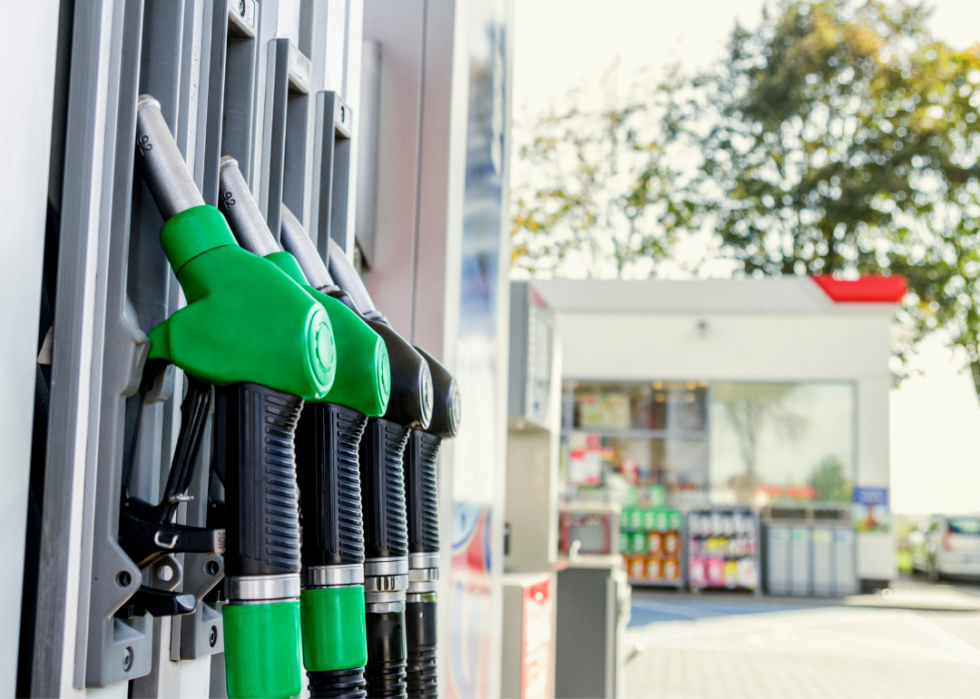
#34. Kentucky
- 2021 gasoline tax: 26.00 cents per gallon (-29.4% less than national average)
- 2021 diesel tax: 23.00 cents per gallon (-39.2% less than national average)
- Total gasoline use: 2,267,439 gallons (2,146,204 highway, 121,235 nonhighway)
Lawmakers in 2020 proposed an increase of 9 cents a gallon to the gasoline tax, new fees on hybrid and electric vehicles, and a change in the way road funds are allocated to cities and counties. Similar increases had died in two previous legislative sessions. The increase was meant to replenish the state’s road fund.

#33. Massachusetts
- 2021 gasoline tax: 26.54 cents per gallon (-27.9% less than national average)
- 2021 diesel tax: 26.54 cents per gallon (-29.9% less than national average)
- Total gasoline use: 2,803,731 gallons (2,658,600 highway, 145,131 nonhighway)
The cost of gasoline could rise between 5 and 9 cents a gallon under a multistate Transportation and Climate Initiative meant to reduce pollution from motor vehicles by at least 26%. In addition, it would raise more than $1.8 billion for green transportation in Massachusetts by 2032. Republican Gov. Charlie Baker signed onto the program in 2020, joining Connecticut, Rhode Island, and Washington D.C. in the agreement.
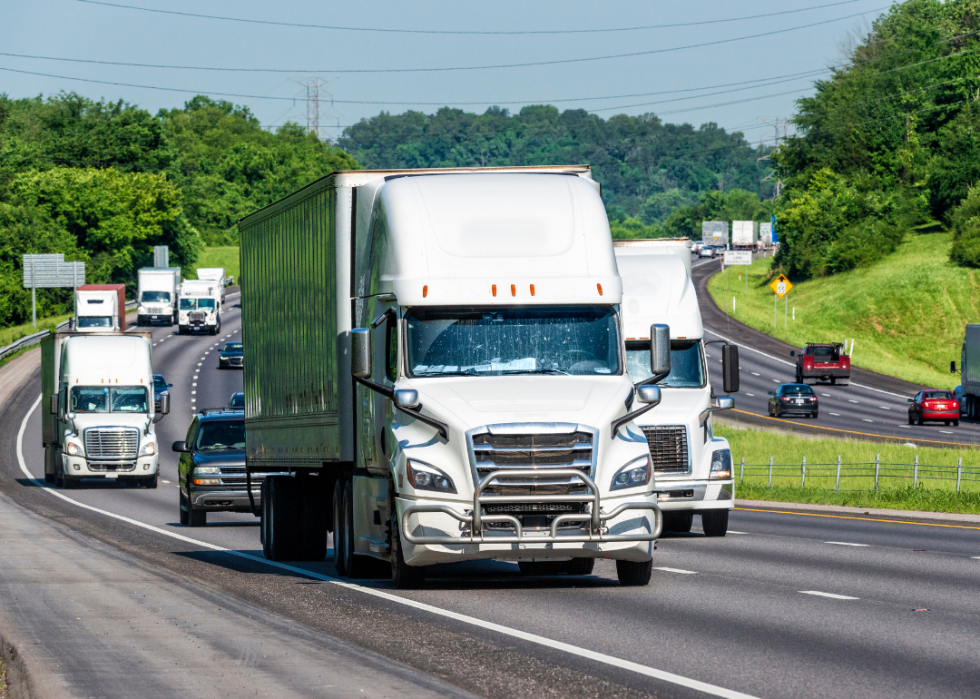
#32. Tennessee
- 2021 gasoline tax: 27.40 cents per gallon (-25.6% less than national average)
- 2021 diesel tax: 28.40 cents per gallon (-25.0% less than national average)
- Total gasoline use: 3,488,212 gallons (3,278,392 highway, 209,820 nonhighway)
Tennessee raised its gasoline tax in 2017 by 6 cents over three years to help fund $10 billion in road work across the state. The increase is part of the IMPROVE Act, or Improving Manufacturing, Public Roads and Opportunities for a Vibrant Economy Act. The goal is $250 million for the state, $70 million for counties, and $35 million for cities, all supporting transportation projects.
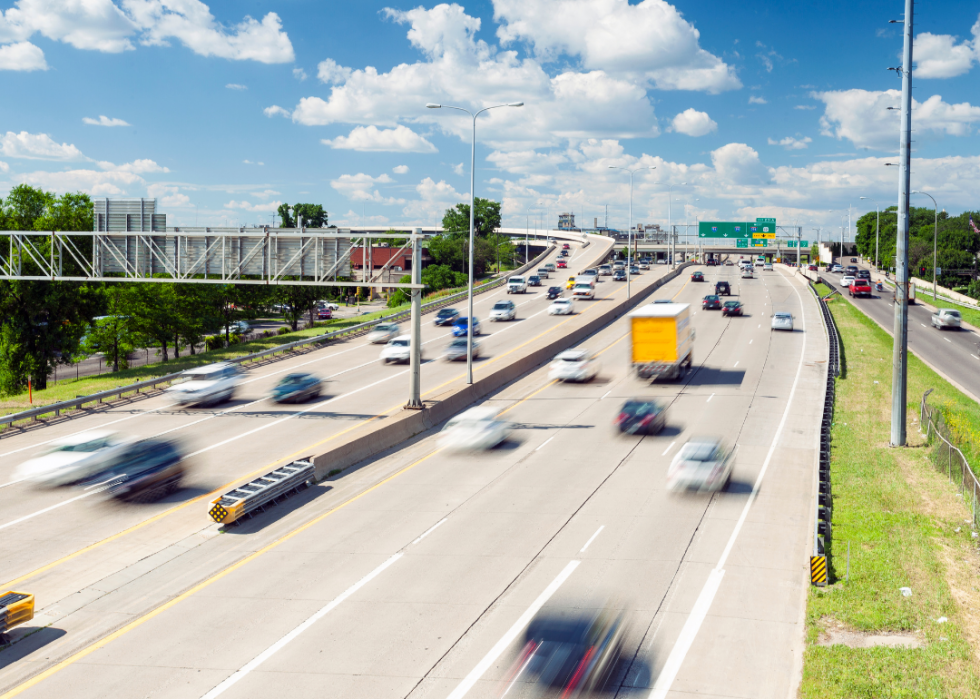
#31. Alabama
- 2021 gasoline tax: 29.21 cents per gallon (-20.7% less than national average)
- 2021 diesel tax: 30.15 cents per gallon (-20.3% less than national average)
- Total gasoline use: 2,855,650 gallons (2,659,652 highway, 195,998 nonhighway)
Alabama’s gasoline tax increased by 2 cents in 2020, the second part of a 10-cent tax increase. The increases are part of the Rebuild Alabama Act, which was passed in 2019 and which has raised millions for road projects. The state department of transportation reportedly sunk $122 million of Rebuild funding into ongoing projects for the fiscal year 2020, including improvements to the state highway system.

#30. Virginia
- 2021 gasoline tax: 29.40 cents per gallon (-20.2% less than national average)
- 2021 diesel tax: 28.50 cents per gallon (-24.7% less than national average)
- Total gasoline use: 4,136,995 gallons (3,919,440 highway, 217,555 nonhighway)
Virginia saw an increase of 5 cents a gallon in its gasoline tax in 2020. A second 5 cents-a-gallon hike will go into effect in 2021. In addition, a regional fuel tax that applied only along Interstate Highway 81 has been expanded to include all of Virginia.
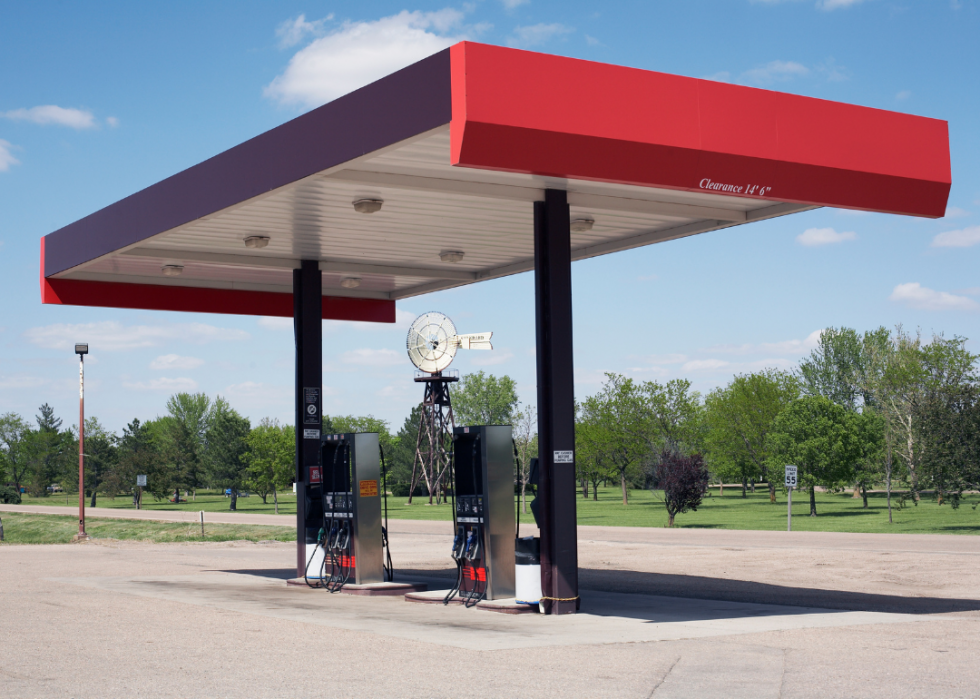
#29. Nebraska
- 2021 gasoline tax: 29.60 cents per gallon (-19.6% less than national average)
- 2021 diesel tax: 29.00 cents per gallon (-23.4% less than national average)
- Total gasoline use: 932,560 gallons (863,333 highway, 69,227 nonhighway)
Nebraska’s gasoline tax fell about 4 cents at the beginning of 2021, after increasing about 4 cents a gallon between July and December in 2020. Nebraska’s tax is calculated twice a year based on a fixed rate set by the legislature, the price of gasoline, and a variable rate based on transportation spending. The fixed rate of the tax last rose in 2015 and increased gradually by 6 cents.
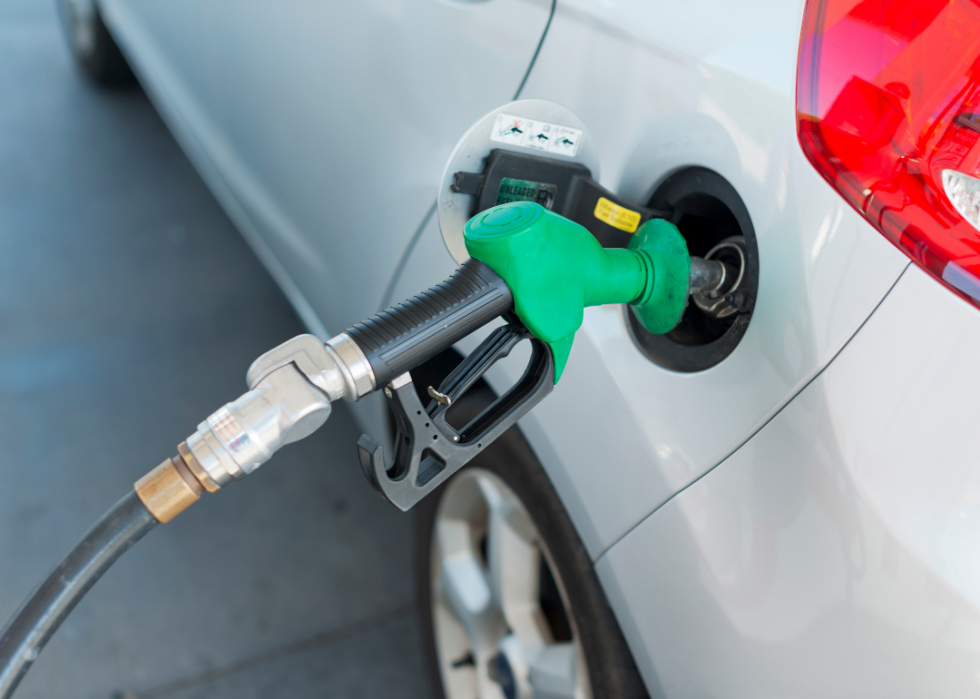
#28. South Dakota
- 2021 gasoline tax: 30.00 cents per gallon (-18.5% less than national average)
- 2021 diesel tax: 30.00 cents per gallon (-20.7% less than national average)
- Total gasoline use: 473,529 gallons (435,583 highway, 37,946 nonhighway)
South Dakota increased its gasoline tax by 6 cents a gallon in 2015 to pay for road projects. At the time it was among a number of states that raised gasoline taxes to compensate for the end of federal transportation funding. The South Dakota increase was designed to bring in an additional $85 million a year for road and bridge projects.
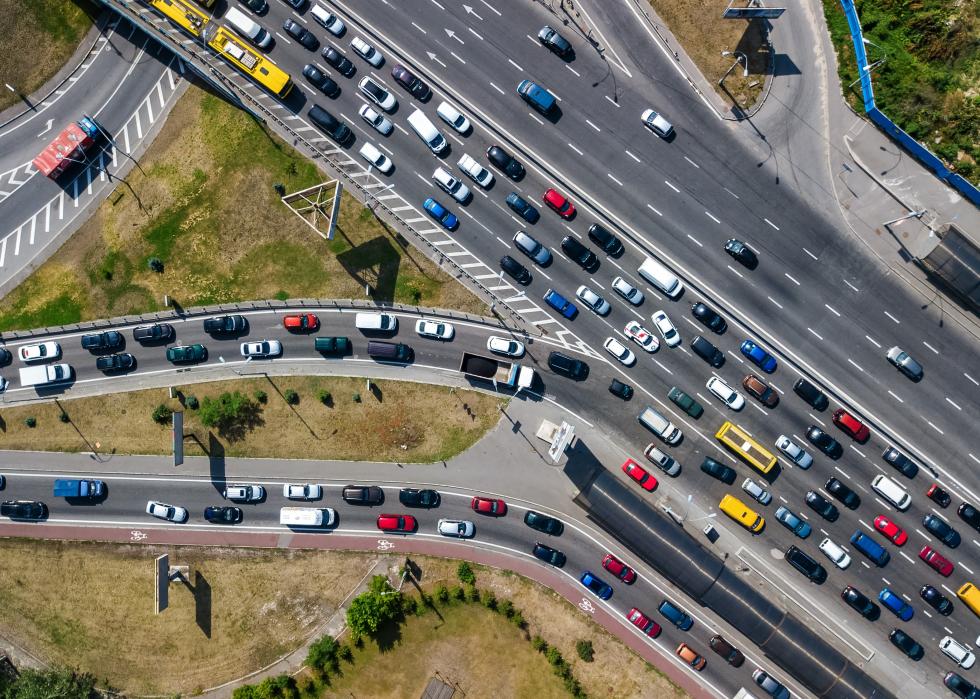
#27. Iowa
- 2021 gasoline tax: 30.00 cents per gallon (-18.5% less than national average)
- 2021 diesel tax: 32.50 cents per gallon (-14.1% less than national average)
- Total gasoline use: 1,683,807 gallons (1,486,910 highway, 196,897 nonhighway)
Iowa increased its gasoline tax by 10 cents a gallon in 2015, with then-Gov. Terry Branstad citing a need for revenue for road and bridge projects. The bipartisan transportation bill was projected to raise $200 million a year for needed improvements to roads and bridges. Before this increase, Iowa’s gasoline tax had not risen since 1989.
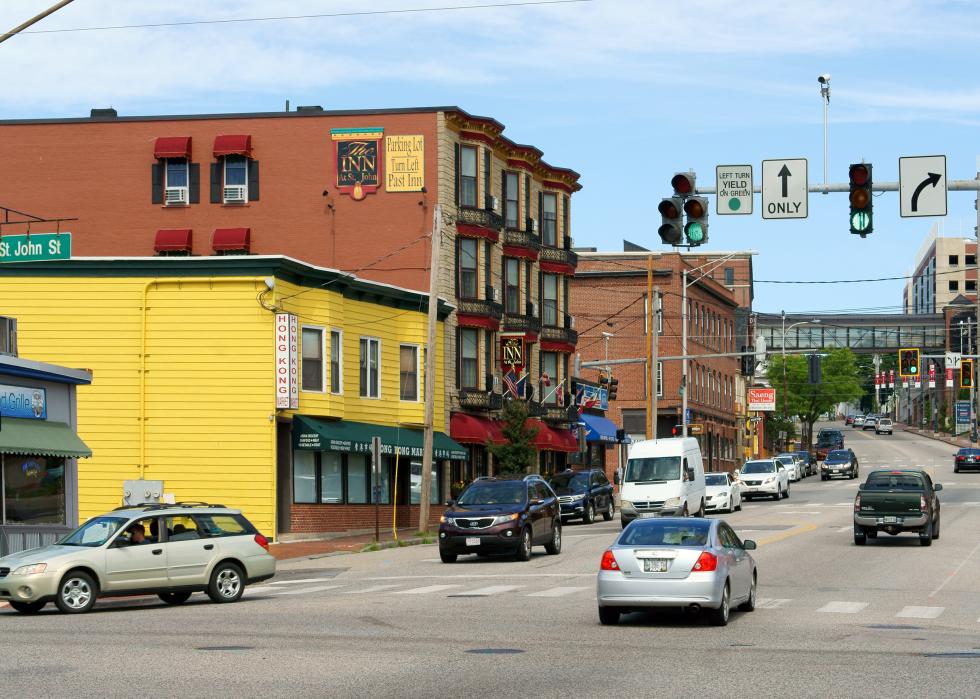
#26. Maine
- 2021 gasoline tax: 30.01 cents per gallon (-18.5% less than national average)
- 2021 diesel tax: 31.21 cents per gallon (-17.5% less than national average)
- Total gasoline use: 658,457 gallons (593,253 highway, 65,204 nonhighway)
A 2019 commission recommended that Maine raise money for its roads through combination of gasoline taxes or fees for electric vehicles and allocations from the general fund. The state faces a $232 million yearly shortfall in its budget for transportation improvement. The gasoline tax rate was frozen in 2011. Before that it was indexed to the inflation rate.
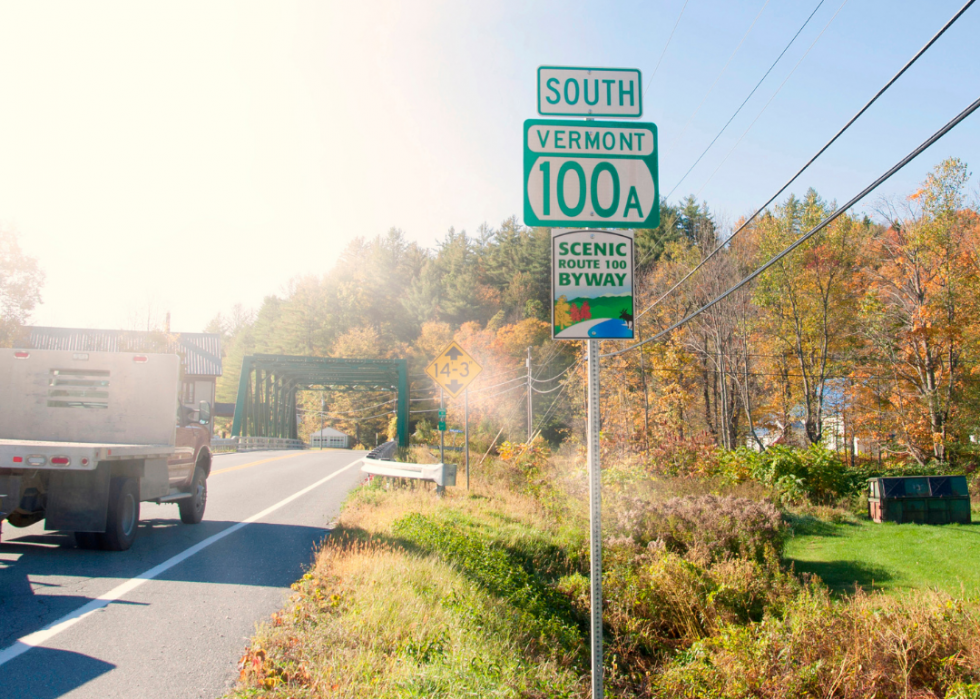
#25. Vermont
- 2021 gasoline tax: 30.46 cents per gallon (-17.3% less than national average)
- 2021 diesel tax: 32.00 cents per gallon (-15.5% less than national average)
- Total gasoline use: 310,332 gallons (288,944 highway, 21,388 nonhighway)
In 2019, a Democratic lawmaker proposed increasing the gasoline tax rate by 4 cents a gallon for five years, but crucial transportation leaders in the legislature indicated they would not support the change. It would have raised $10 million for municipal road projects each year. The governor also opposed the proposal. Vermont last raised its gasoline tax in 2013.
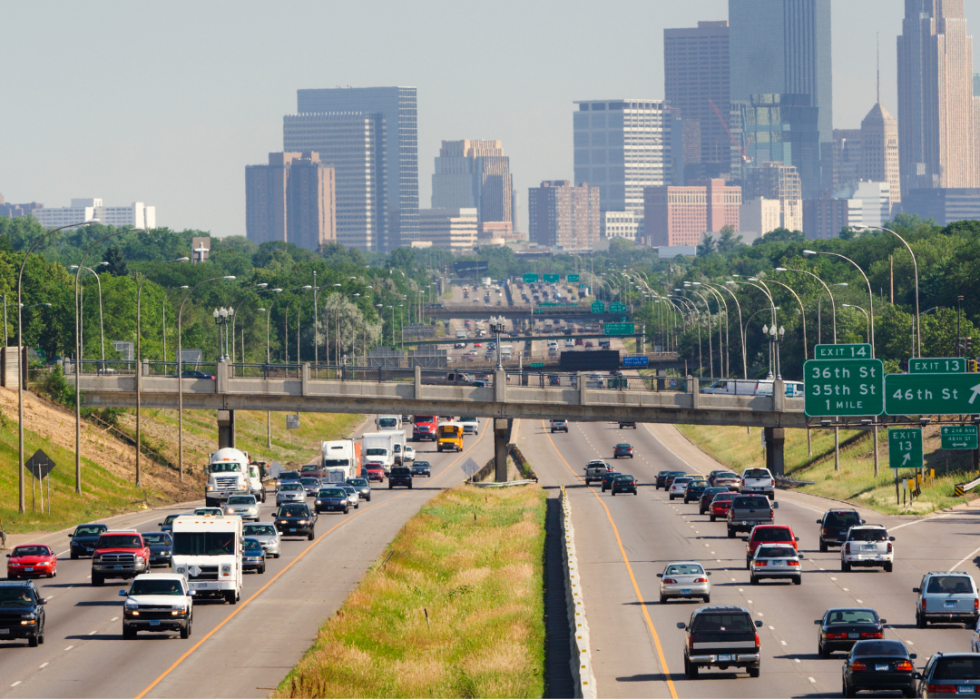
#24. Minnesota
- 2021 gasoline tax: 30.60 cents per gallon (-16.9% less than national average)
- 2021 diesel tax: 30.60 cents per gallon (-19.2% less than national average)
- Total gasoline use: 2,686,329 gallons (2,411,151 highway, 275,178 nonhighway)
The Minnesota House approved a transportation bill that included a 20 cents-per-gallon hike to pay for road and bridge projects in 2019, but it died in the Senate. The increase was to be stretched out over four years, at 5 cents a year.

#23. Utah
- 2021 gasoline tax: 31.41 cents per gallon (-14.7% less than national average)
- 2021 diesel tax: 31.41 cents per gallon (-17.0% less than national average)
- Total gasoline use: 1,269,553 gallons (1,190,445 highway, 79,108 nonhighway)
Utah’s gasoline tax saw a small increase in 2021, by 3 cents for every 10 gallons. The Salt Lake Tribune calculated that would amount to about $1.62 for the year for a car that gets about 25 miles to the gallon and drives about 13,500 miles annually. The Utah State Tax Commission adjusts the tax each year.

#22. Montana
- 2021 gasoline tax: 32.75 cents per gallon (-11.1% less than national average)
- 2021 diesel tax: 30.20 cents per gallon (-20.2% less than national average)
- Total gasoline use: 555,974 gallons (485,015 highway, 70,959 nonhighway)
The state’s legislature passed a fuel tax increase in 2017 to raise $49 million annually for state and local road projects. The state’s gasoline tax rate subsequently increased by 5 cents and another increase of 1 cent will be phased in through 2023. Missoula County, the state’s second largest county, approved a 2-cent a gallon local tax in 2020 for its road projects.
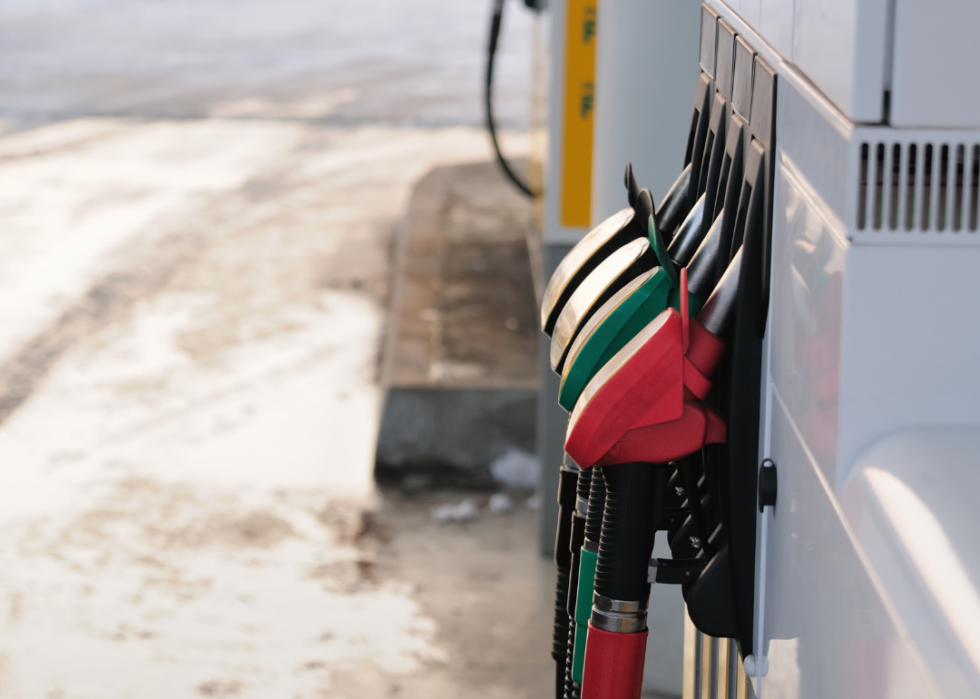
#21. Wisconsin
- 2021 gasoline tax: 32.90 cents per gallon (-10.7% less than national average)
- 2021 diesel tax: 32.90 cents per gallon (-13.1% less than national average)
- Total gasoline use: 2,708,385 gallons (2,461,021 highway, 247,364 nonhighway)
Wisconsin’s Democratic Gov. Tony Evers called for a hike of 8 cents a gallon in his two-year budget proposal in 2019. It also would have indexed the gasoline tax for automatic increases. The gasoline tax had been indexed under a 1985 law, but that law was repealed in 2005. Evers’ proposal was rejected by the Republican-controlled Joint Finance Committee, which instead approved a raise in registration fees.

#20. Idaho
- 2021 gasoline tax: 33.00 cents per gallon (-10.4% less than national average)
- 2021 diesel tax: 33.00 cents per gallon (-12.8% less than national average)
- Total gasoline use: 861,439 gallons (734,046 highway, 127,393 nonhighway)
Idaho last increased its gasoline tax in 2015. The 7 cents-a-gallon hike, to raise money for road and bridge projects, was accompanied by an increase in vehicle registration fees, and a new fee on electric and hybrid cars. The new rate was expected to raise $95 million a year. The state, however, faced a $262 million shortfall in the budget for its transportation system.
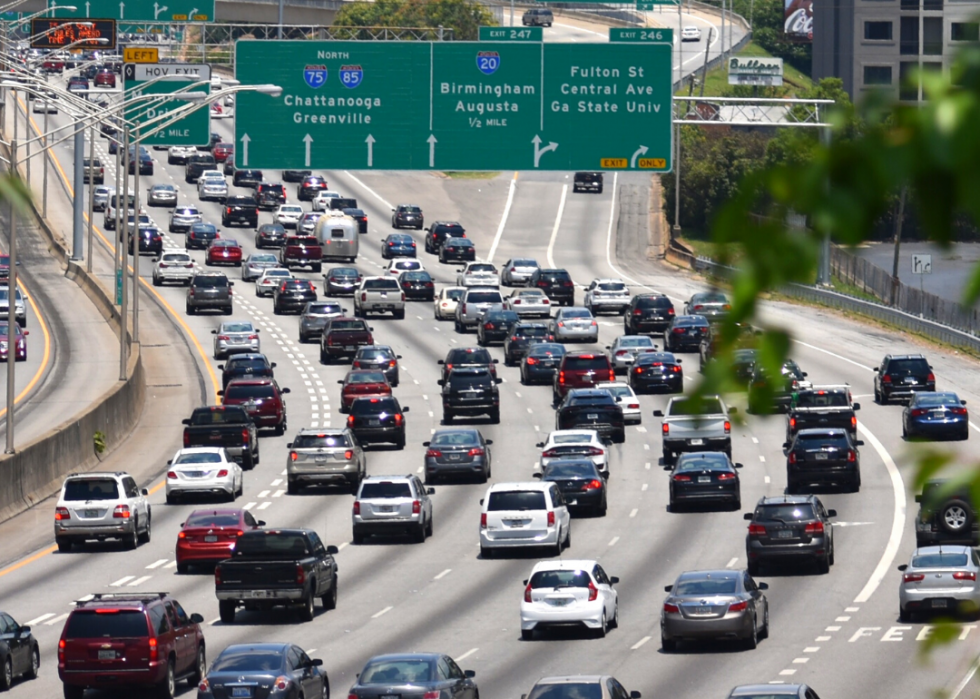
#19. Georgia
- 2021 gasoline tax: 33.96 cents per gallon (-7.8% less than national average)
- 2021 diesel tax: 37.26 cents per gallon (-1.6% less than national average)
- Total gasoline use: 5,019,607 gallons (4,743,377 highway, 276,230 nonhighway)
Georgia’s lawmakers in 2015 increased the gasoline tax by 6.7 cents per gallon and indexed the tax rate to the consumer price index and average vehicle efficiency. They also imposed new registration fees for electric vehicles, and on heavy vehicles. The state expected to raise $1.2 billion by 2020.
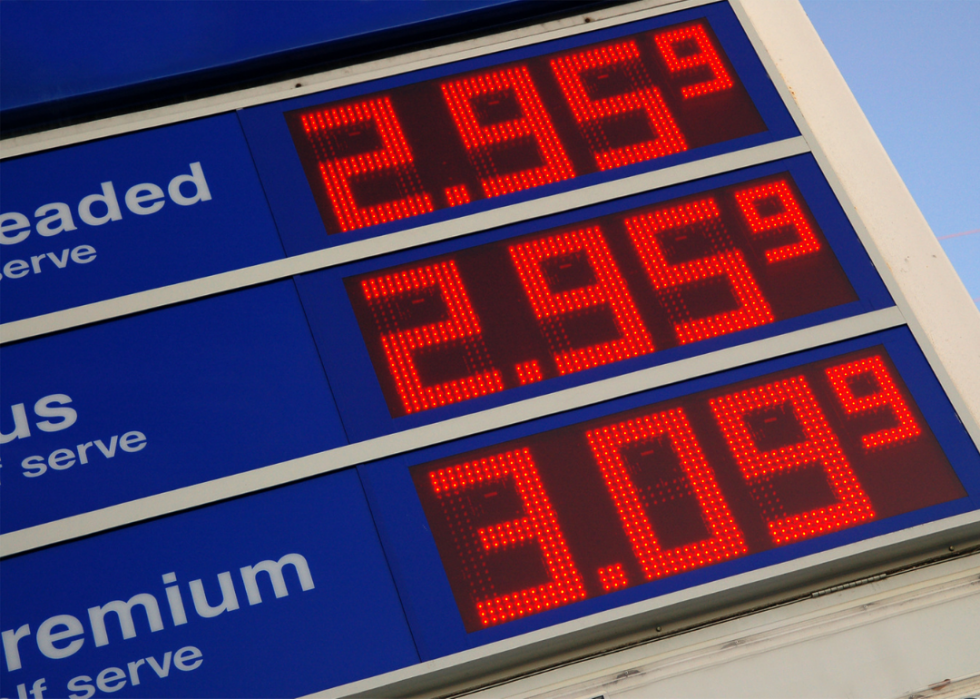
#18. Rhode Island
- 2021 gasoline tax: 35.00 cents per gallon (-5.0% less than national average)
- 2021 diesel tax: 35.00 cents per gallon (-7.5% less than national average)
- Total gasoline use: 389,233 gallons (366,451 highway, 22,782 nonhighway)
Rhode Island’s gasoline tax will not increase in 2021. Since 2015, the state has altered its gasoline tax rate every two years to the match the rate of inflation. It increased by 1 cent in 2015 and 1 cent in 2019. In 2016, Rhode Island implemented a new toll on commercial trucks to pay for repairs to 650 roads and bridges rather than raise the gasoline tax.
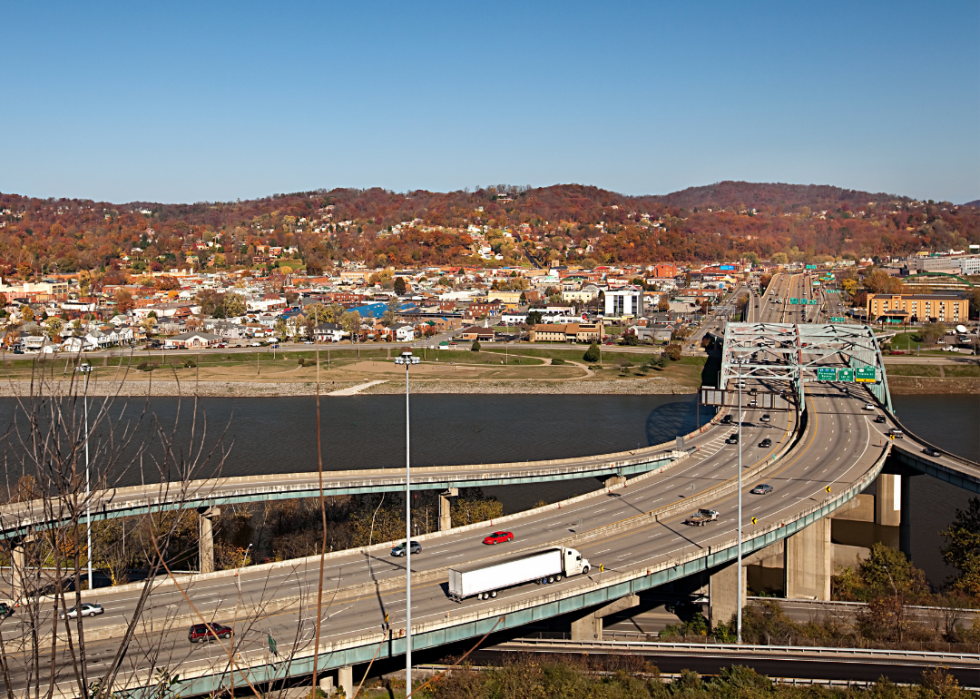
#17. West Virginia
- 2021 gasoline tax: 35.70 cents per gallon (-3.1% less than national average)
- 2021 diesel tax: 35.70 cents per gallon (-5.7% less than national average)
- Total gasoline use: 847,699 gallons (791,672 highway, 56,027 nonhighway)
According to MetroNews, West Virginia was one of seven states that saw an increase in their gasoline taxes in 2017. Before the increase, its gasoline tax dropped for three years, losing $50 million in revenue for road repairs.
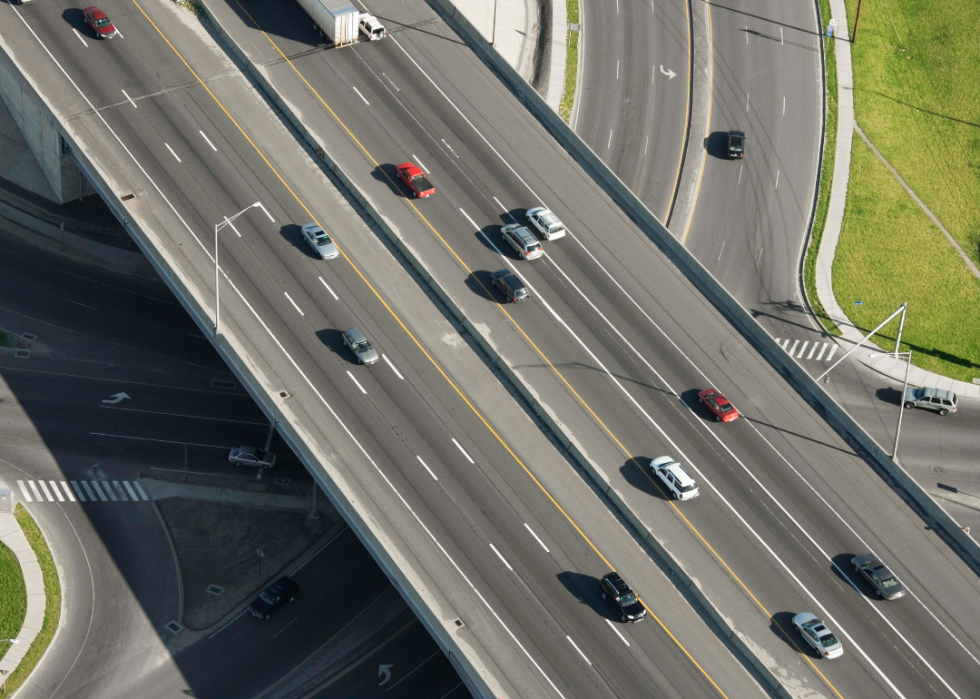
#16. Connecticut
- 2021 gasoline tax: 35.75 cents per gallon (-2.9% less than national average)
- 2021 diesel tax: 44.60 cents per gallon (17.8% greater than national average)
- Total gasoline use: 1,517,405 gallons (1,437,444 highway, 79,961 nonhighway)
Connecticut’s gasoline tax has stayed the same since 2000. But that could change under the Transportation and Climate Initiative Program, which Gov. Ned Lamont signed onto last year. This initiative could indirectly affect the gasoline price, as wholesalers buy credits if they go over pollution limits.
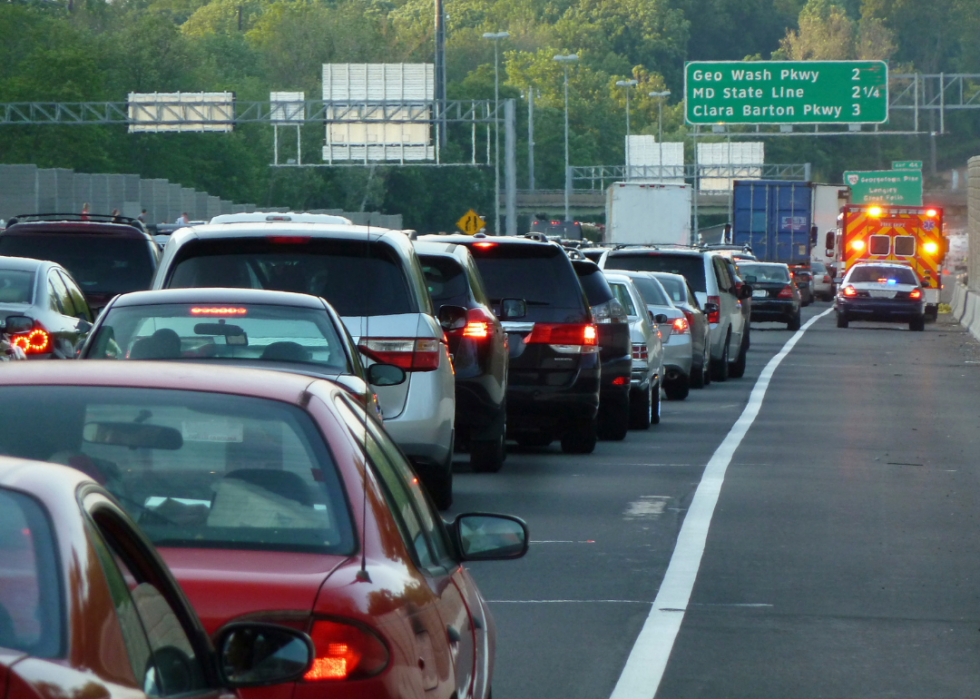
#15. Maryland
- 2021 gasoline tax: 36.30 cents per gallon (-1.4% less than national average)
- 2021 diesel tax: 37.05 cents per gallon (-2.1% less than national average)
- Total gasoline use: 2,748,322 gallons (2,602,302 highway, 146,020 nonhighway)
The gasoline tax fell slightly by 0.7 cents in 2020, the result of an inflation indexing law. Lawmakers in 2013 began a phase-in of the first gasoline tax hike in 20 years. The rise in the tax rate began with a 4-cent increase and was intended to bring in $4.4 billion for transportation projects.
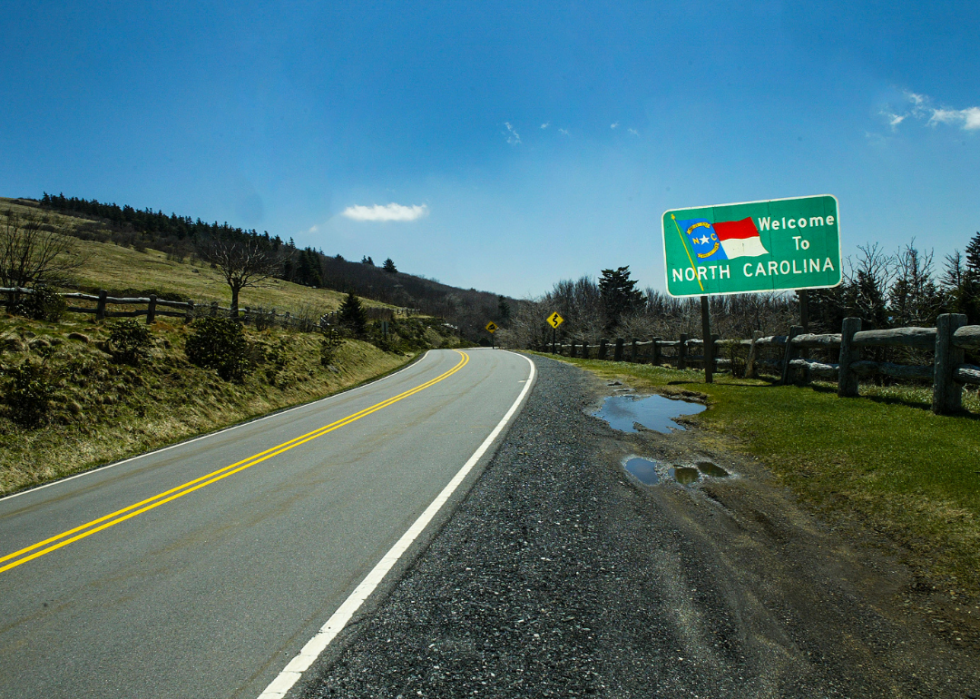
#14. North Carolina
- 2021 gasoline tax: 36.35 cents per gallon (-1.3% less than national average)
- 2021 diesel tax: 36.35 cents per gallon (-4.0% less than national average)
- Total gasoline use: 5,082,797 gallons (4,633,090 highway, 449,707 nonhighway)
A report published in January 2021 by the North Carolina Future Investment Resources for Sustainable Transportation Commission recommends that the state look for new ways to fund road and bridge projects, airports, mass transit, and other transportation. Gasoline taxes currently fund most of the state’s transportation projects, but electric vehicles and better fuel mileage have cut into the amount collected. The commission proposes increasing vehicle taxes and the sales tax, and perhaps charging drivers based on mileage. In 2015, state lawmakers cut pennies off the state gasoline tax instead of a larger cut that had been planned.
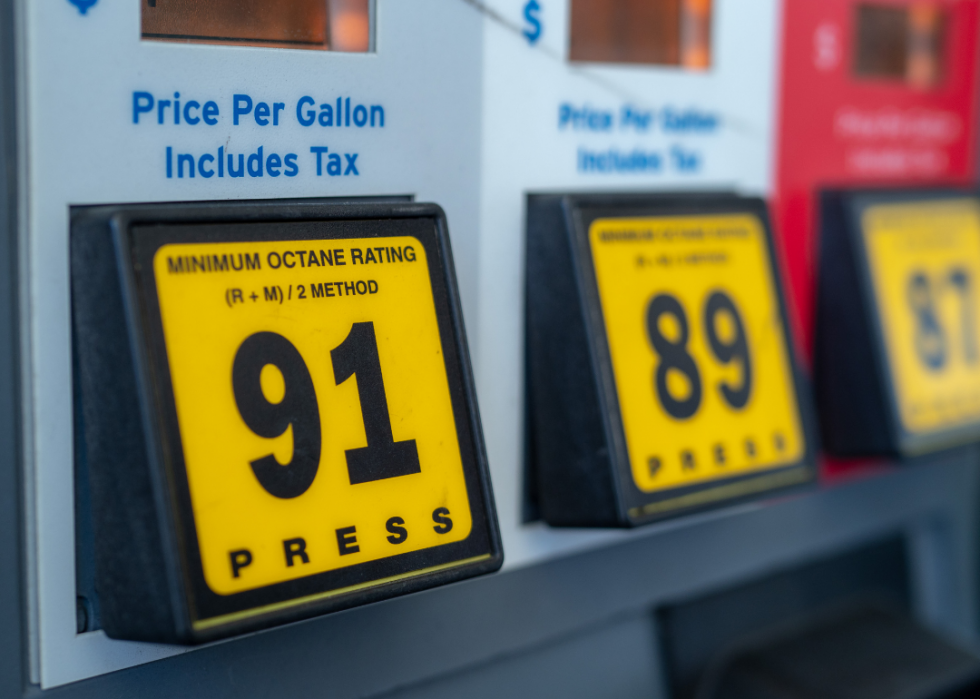
#13. Ohio
- 2021 gasoline tax: 38.51 cents per gallon (4.6% greater than national average)
- 2021 diesel tax: 47.01 cents per gallon (24.2% greater than national average)
- Total gasoline use: 5,146,016 gallons (4,788,084 highway, 357,932 nonhighway)
Ohio increased its gasoline tax by 10.5 cents in 2019, part of a two-year transportation budget. The funds are to be set aside for road and bridge projects, as required by the state constitution. At the time, the state said that $156 million in maintenance projects that had stalled due to a lack of funds were back on track thanks to the tax bump.
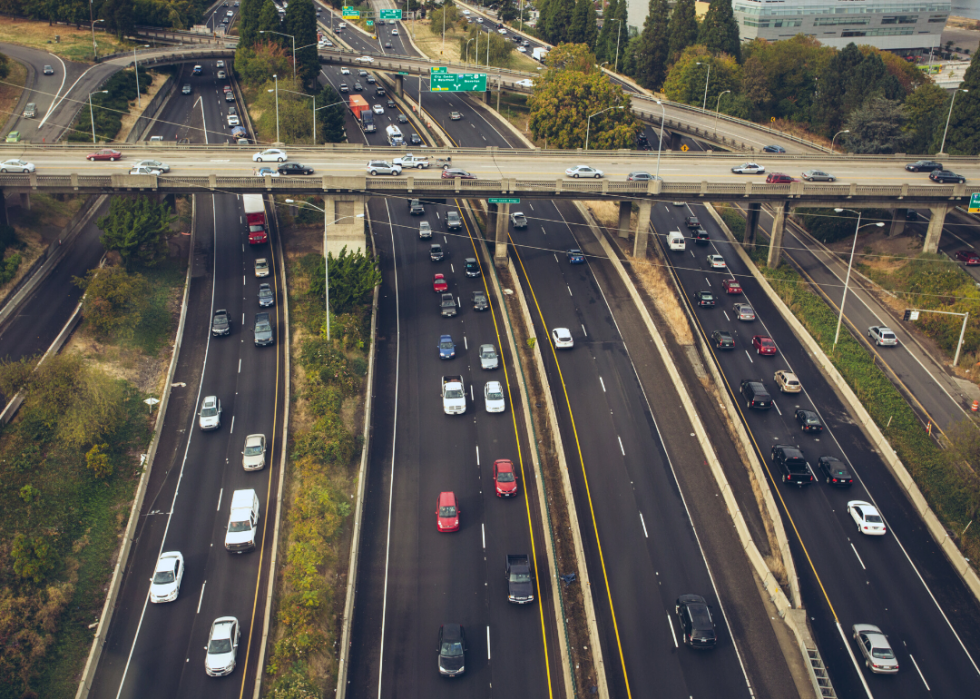
#12. Oregon
- 2021 gasoline tax: 38.83 cents per gallon (5.4% greater than national average)
- 2021 diesel tax: 38.06 cents per gallon (0.6% greater than national average)
- Total gasoline use: 1,629,593 gallons (1,506,779 highway, 122,814 nonhighway)
Oregon’s gasoline tax increased by 2 cents last year, the second of four increases that lawmakers approved in 2017. The higher rate is expected to raise $60 million for the state’s department of transportation and to the state’s cities and counties.
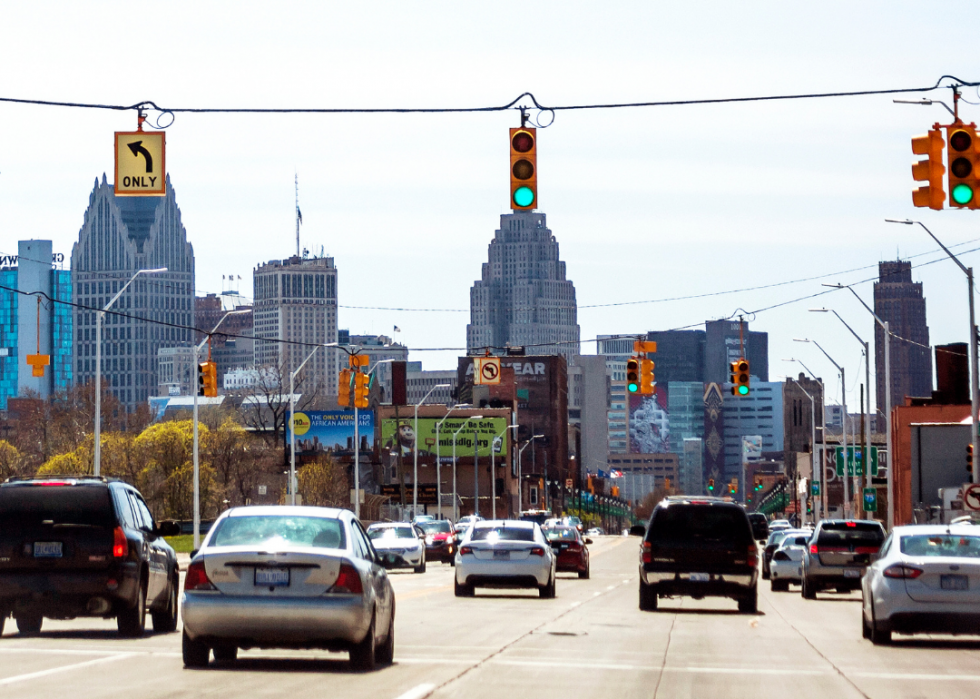
#11. Michigan
- 2021 gasoline tax: 41.98 cents per gallon (14.0% greater than national average)
- 2021 diesel tax: 43.18 cents per gallon (14.1% greater than national average)
- Total gasoline use: 4,862,405 gallons (4,381,530 highway, 480,875 nonhighway)
Michigan’s Democratic Gov. Gretchen Whitmer in 2019 proposed raising the gasoline tax by 45 cents a gallon, but her plan was rejected by Republicans. An earlier 2015 transportation plan was expected to raise about $880 million when it was fully implemented by 2021. State officials said that was not enough to solve Michigan’s transportation problems.
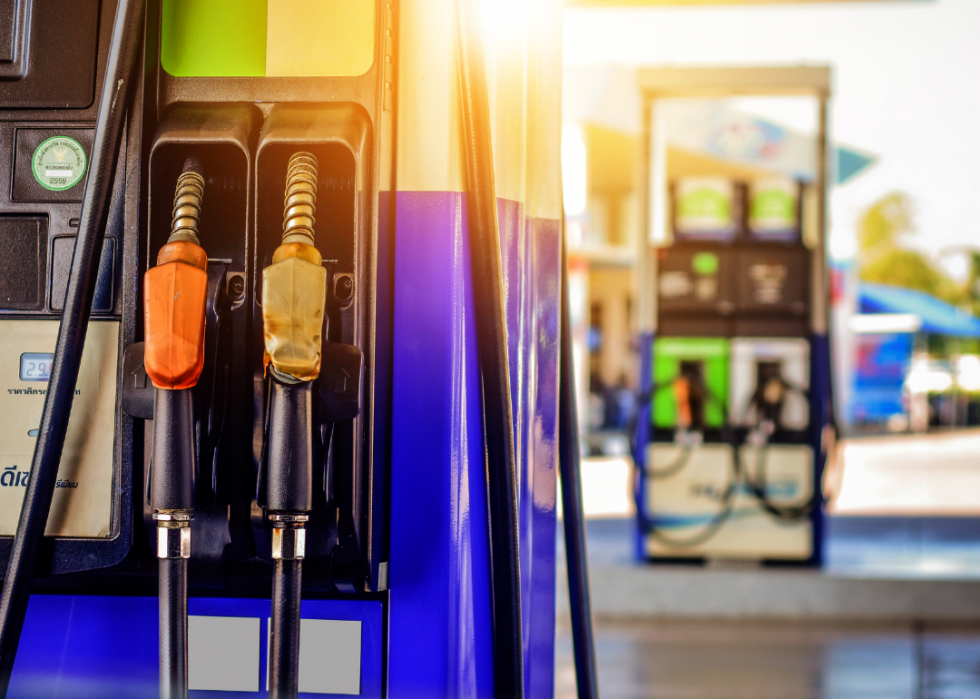
#10. Indiana
- 2021 gasoline tax: 42.16 cents per gallon (14.5% greater than national average)
- 2021 diesel tax: 52.00 cents per gallon (37.4% greater than national average)
- Total gasoline use: 3,143,618 gallons (2,934,667 highway, 208,951 nonhighway)
Indiana in 2017 increased the gasoline tax by 10 cents a gallon. The state’s gas tax is adjusted each year to keep up with inflation and it is linked to gas prices. The tax brings in $1.2 billion each year for road maintenance and construction, primarily for state work.
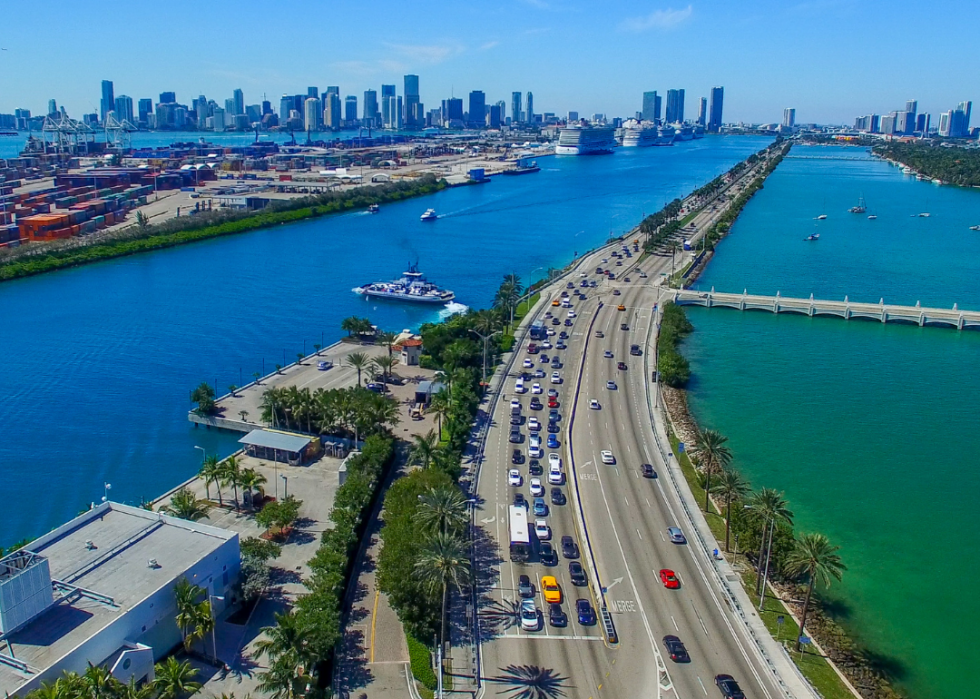
#9. Florida
- 2021 gasoline tax: 42.46 cents per gallon (15.3% greater than national average)
- 2021 diesel tax: 35.57 cents per gallon (-6.0% less than national average)
- Total gasoline use: 9,463,931 gallons (8,586,669 highway, 877,262 nonhighway)
Florida’s gasoline tax varies by area. It is adjusted every year, indexed to the rate of inflation. Counties and municipalities can add up to 12 cents per gallon to the gasoline tax, for local infrastructure.
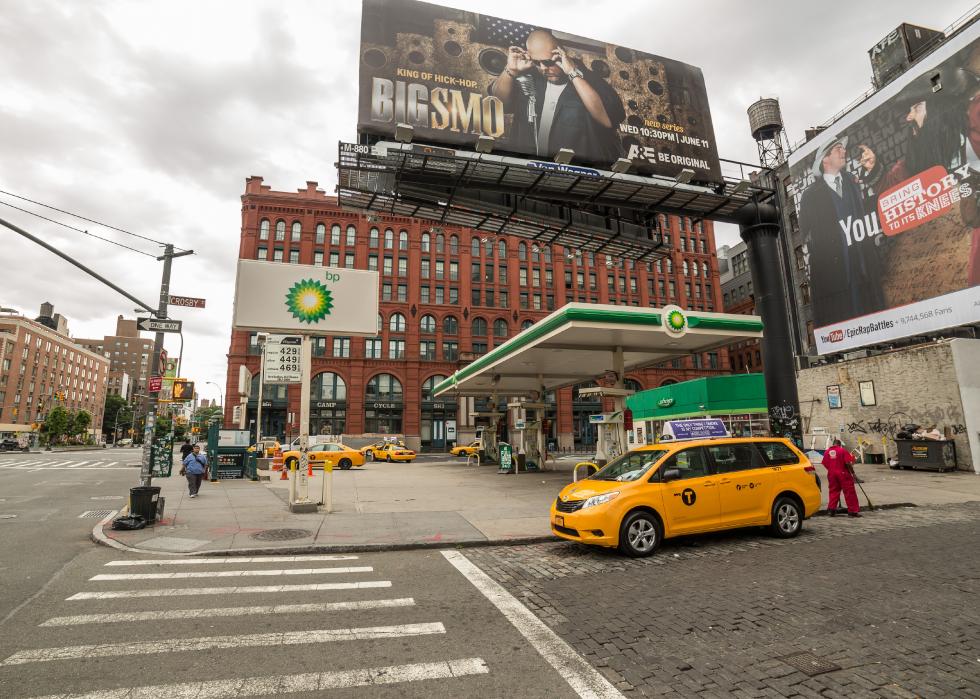
#8. New York
- 2021 gasoline tax: 42.70 cents per gallon (15.9% greater than national average)
- 2021 diesel tax: 42.43 cents per gallon (12.1% greater than national average)
- Total gasoline use: 5,813,226 gallons (5,401,064 highway, 412,162 nonhighway)
Increases in New York’s gasoline tax in the 1990s were meant to fund highway and bridge improvements. But money has gone also to mass transit, buses, subways, and commuter railroads. The Transportation and Climate Initiative under consideration among states in the Northeast and Mid-Atlantic could mean higher costs for gas.

#7. Hawaii
- 2021 gasoline tax: 46.84 cents per gallon (27.2% greater than national average)
- 2021 diesel tax: 49.55 cents per gallon (30.9% greater than national average)
- Total gasoline use: 471,878 gallons (436,711 highway, 35,167 nonhighway)
Hawaii saw a drop in money available for road repair in 2020 with drivers using 18% less gasoline during the coronavirus pandemic. In 2019, lawmakers proposed raising gasoline taxes 37.5%, from 16 cents to 22 cents per gallon. The increase would bring in $40 million a year for road construction and maintenance.
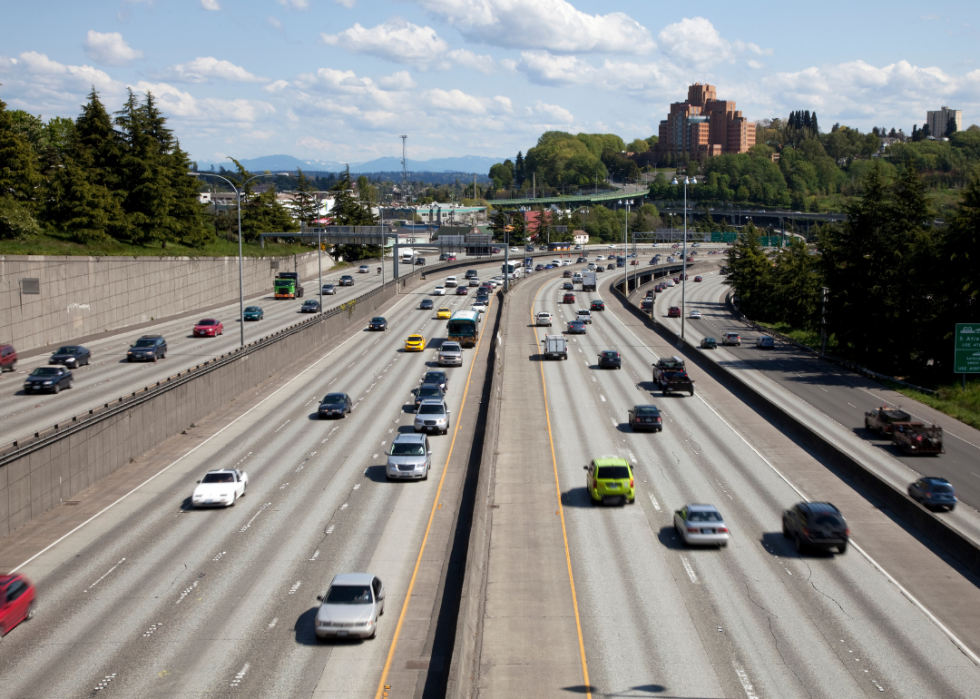
#6. Washington
- 2021 gasoline tax: 49.40 cents per gallon (34.1% greater than national average)
- 2021 diesel tax: 49.40 cents per gallon (30.5% greater than national average)
- Total gasoline use: 3,009,259 gallons (2,811,430 highway, 197,829 nonhighway)
Washington’s Democratic lawmakers want to increase the gasoline tax by 18 cents under a $25.8 billion transportation budget proposal that also includes a new fee on carbon emissions. The revenue would go toward road projects. The 18-cent gasoline tax increase would be phased over two years. After that the tax would be indexed for inflation.
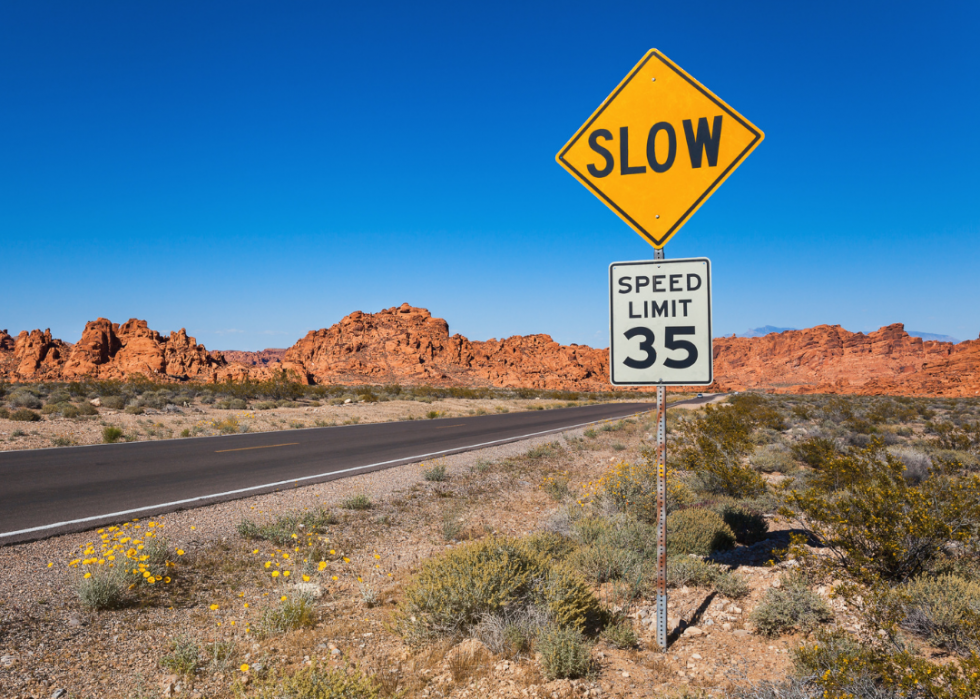
#5. Nevada
- 2021 gasoline tax: 50.48 cents per gallon (37.1% greater than national average)
- 2021 diesel tax: 28.56 cents per gallon (-24.5% less than national average)
- Total gasoline use: 1,254,299 gallons (1,157,367 highway, 96,932 nonhighway)
Nevada also is grappling with how to pay for its highway fund as more electric vehicles and fuel-efficient vehicles take to the road. A good portion of the fund is financed through the state’s gasoline tax. According to the Las Vegas Sun, Nevada collected $197.6 million for the fund from gas taxes in 2008 compared to $210.6 million in 2018.
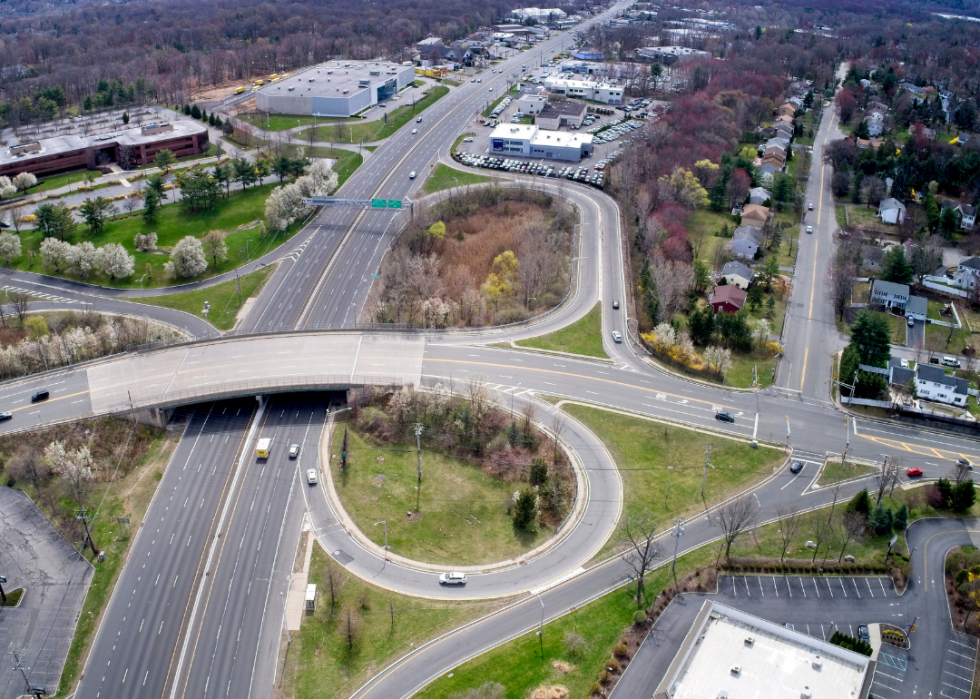
#4. New Jersey
- 2021 gasoline tax: 50.70 cents per gallon (37.7% greater than national average)
- 2021 diesel tax: 57.70 cents per gallon (52.4% greater than national average)
- Total gasoline use: 3,977,410 gallons (3,770,732 highway, 206,678 nonhighway)
New Jersey’s gasoline tax rose 9.3 cents a gallon in 2020 to bring in money for the state’s Transportation Trust Fund. The state is required by law to set aside money for infrastructure. Because of the coronavirus pandemic, fewer drivers are on the road, and revenues have fallen. Gasoline demand has dropped about 15%. At the same time, though, the price of gasoline has fallen.
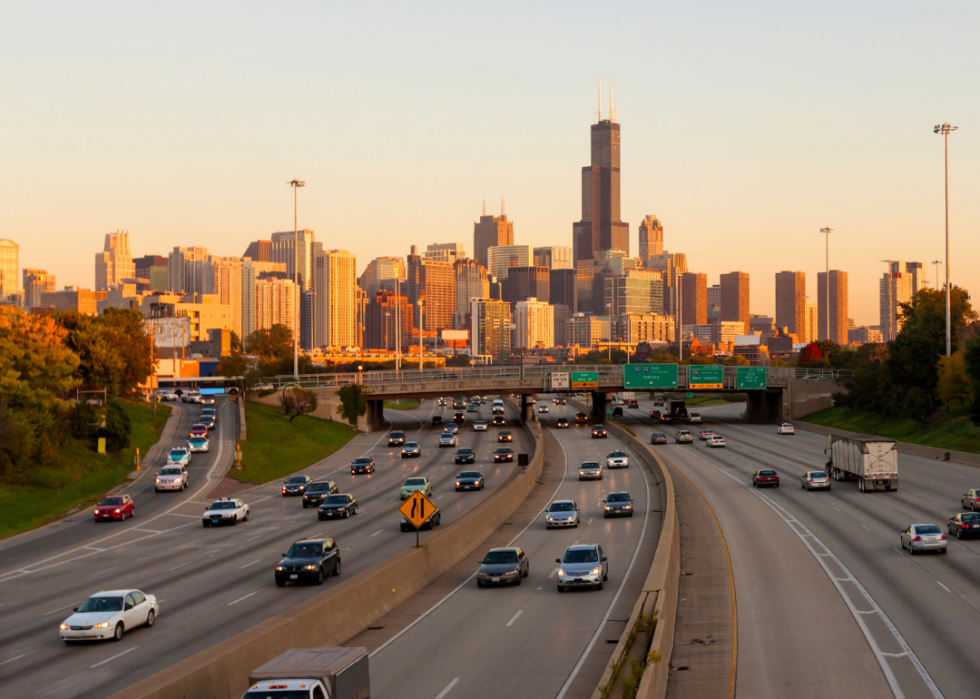
#3. Illinois
- 2021 gasoline tax: 52.16 cents per gallon (41.6% greater than national average)
- 2021 diesel tax: 59.98 cents per gallon (58.5% greater than national average)
- Total gasoline use: 4,759,031 gallons (4,454,984 highway, 304,047 nonhighway)
Illinois’s gasoline tax rate rose by 19 cents in 2019, for the first time since 1990. In July 2020, the state saw its first automatic increase, by the rate of inflation. The money is intended to help fund a $45 billion capital plan. Illinois is one of seven states that adds a general sales tax on top of the gasoline tax.
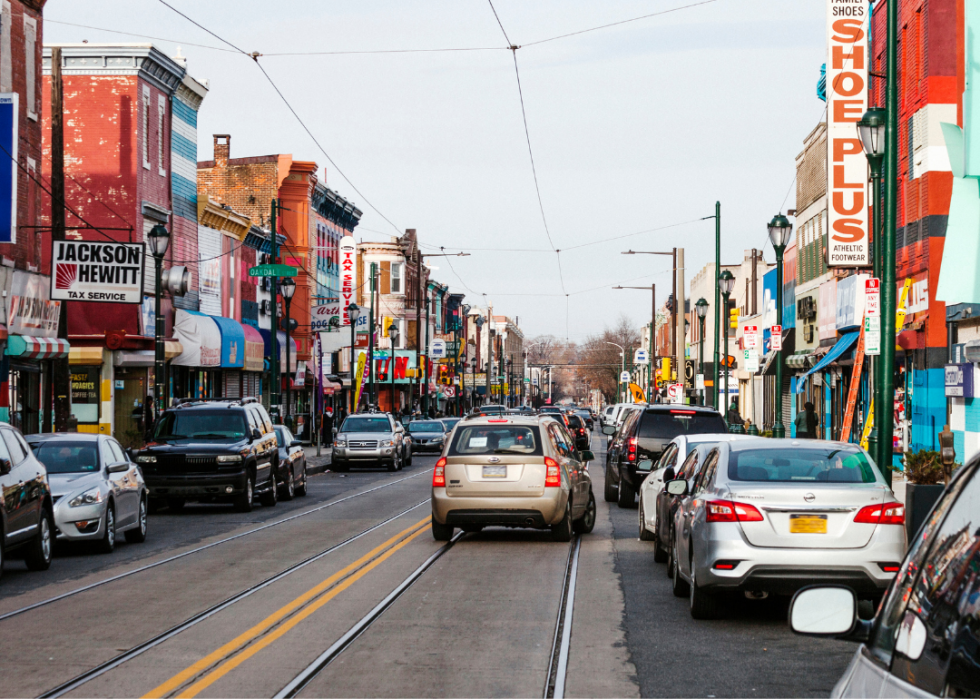
#2. Pennsylvania
- 2021 gasoline tax: 58.70 cents per gallon (59.4% greater than national average)
- 2021 diesel tax: 75.20 cents per gallon (98.7% greater than national average)
- Total gasoline use: 4,980,152 gallons (4,679,656 highway, 300,496 nonhighway)
A 2013 transportation funding bill changed the way gasoline taxes are assessed in the state of Pennsylvania. The Oil Company Franchise Tax is paid by fuel distributors at the wholesale level, but how the tax is passed on to drivers varies. Money raised enabled the state to repair its bridges.

#1. California
- 2021 gasoline tax: 63.05 cents per gallon (71.2% greater than national average)
- 2021 diesel tax: 83.06 cents per gallon (119.4% greater than national average)
- Total gasoline use: 15,431,588 gallons (14,432,583 highway, 999,005 nonhighway)
California’s gasoline tax rose for the third time in four years in 2020, a 3.2-cent increase that is expected to bring in about $7 billion in the fiscal year to pay for repairs and for maintenance. In addition, the tax is adjusted each year based on the state’s consumer price index. Electric vehicle owners are being charged a $100 road improvement fee when they register or re-register their cars.



